Ludvig Sunström's Blog, page 11
July 28, 2014
How to Build Something From Nothing And Be #1 at it (the Arnold Effect)
Last week I told you. . .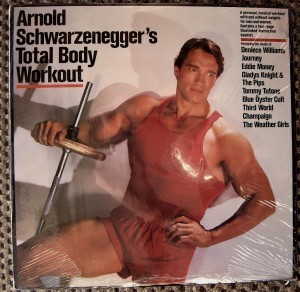
. . .That megastars aren’t just supported by the crowd.
Except for their elite skill and their entertainment value, there is another a reason they’ve have risen meteorically, and it’s because. . .
. . .They’ve been helped by big industry influencers, businessmen, and teams of marketers.
This is how megastars like George St-Pierre (MMA) and Magnus Carlsen (chess) have become so immensely popular. Now, why would these marketers and other people help them out?
Because, they’re ordered to by the industry big shots.
And these industry big shots want — and need — as many poster boys as they can find. So that they can grow the market of that industry. And why do you think they want to do that?
Well, obviously, so that they can earn more money.
In other words, it’s not an act of generosity.
There’s a strong incentive there. For example, George St-Pierre has definitely been one of the main driving forces behind pushing the UFC into the mainstream.
He’s been the perfect poster boy for the kind of image that the UFC has wanted to portray in order to be respected and accepted into the mainstream.
Because GSP has been the perfect martial artist gentleman, always acting politely and sportsmanlike.
And in chess, they’re hoping that Magnus Carlsen can do the same thing, and bring it into the mainstream. . .
. . .Because that’s where the big money is.
And the reason I tell you this is because this is what we’re going to look at today. We’re going to examine someone who brought an obscure sport into the mainstream, and in doing so, helped build a multibillion dollar industry.
We’re going to look at how. . .
Arnold Schwarzenegger Made Bodybuilding Big
To hell with it. We’re either going to be #1 or #2 in every field we’re in or we’re going to be out.
–Jack Welch
This is what how Arnold Schwarzenegger thought, from a very early age. He quickly decided he was going to be the best – and he wouldn’t settle for anything less.
Arnold was an athletically talented teenager. He considered going pro in soccer or swimming. But ultimately, he didn’t do it. Because he didn’t think he could become the best at it.
He didn’t think he had the best physique for those sports, plus he thought that the competition was too tough. So Arnold chose bodybuilding instead. Because he believed it was a better fit for his body.
Even though bodybuilding was a very small sport at the time, with little money and fame, Arnold didn’t care that much.
And this is key.
Because is a mindset you’ll see among many ultra-successful people. They’d rather build something of their own — no matter how much work it takes — than to follow a lane created by someone else.
Most people don’t think like this. They’re afraid of trying new things.
Unless the thing is safe, and has been proven to work by someone else, most people won’t do it. Especially when it comes to something like their choice of career.
Most people’s mindset: “I’ll wait until someone else does it, see how it goes, then make a decision.”
Arnold’s mindset: “By being an early adopter I’m given seizing the opportunity to get ahead, and become the best!”
And Arnold did become the best, and he did make a ton of money in the process.
But how did he do it? What principles did he follow? What is the Arnold Effect?
To explain these things, I think it’s best we start from. . .
The Beginning
When Arnold was 20, he flew to England to compete for the title of Mr. Universe, but he came in at second place. At first, he was devastated.
But soon, things brightened up. For Arnold met some very influential people in the bodybuilding industry who were impressed by him.
One of those people was Charles Bennett, a judge at the competition. Bennett let Arnold stay with him in England — for free. He also coached him and gave him (lots of) free food.
With the help of Bennett, and some other people, Arnold went on to win the title of Mr. Universe in his next competition.
Then he went to Germany where he studied business, worked out (and coached) for several hours per day in the gym, in preparation for his next Mr. Universe competition. How was Arnold able to balance all these things at the same time?
With some damn dedication. . .
. . . Combined with a cocktail of steroids.
When Arnold was 21 years old he moved to the U.S and started working with Joe Weider — who was the top dog in the bodybuilding and fitness industry.
It was at this point, when Arnold moved to the U.S, that his road to megastardom started. And it was also now that his entrepreneurial talent started shining through.
Because over the coming years he started a couple of businesses of his own. One of those businesses sold fitness and bodybuilding products. This would turn out to be a very smart idea some years later.

Arnold showed himself to be a savvy businessman and he made his first million dollar around age 30. Not from bodybuilding, but from real estate.
He kept up his hectic schedule consisting of working out for competitions, running his businesses, and attending college.
It was now that Arnold’s big break came — thanks to his. . .
Talent For Marketing And Promotion
Which he used to attract lots of attention to the documentary Pumping Iron in 1977.
Thanks to the success of Pumping Iron, Arnold was able to kill two birds with one stone: He furthered his career as an upcoming actor, and he helped grow the bodybuilding industry.
Arnold’s actually a lot more intelligent than people think he is . .
. . .For example, when I was on exchange in Canada, I had this course in marketing. A guy who I was doing a team assignment with — a guy who was considered smart, and was a straight-A student — told me:
“Dude, Arnold Schwarzenegger is an idiot. He doesn’t know anything except how to flex his biceps and take steroids. He’s a stupid Neanderthal.”
I asked the guy, “How do you suppose he became so successful then?”
And, of course, I didn’t get a good answer back.
(The answer I got was: “Well, uh, he took steroids!”)
That just goes to show that lot of people who are considered smart really aren’t. For some reason, this guy couldn’t get over the “stupid bodybuilder” stereotype.
But anyway, how did Arnold become so successful?
–Through his skillful promotion of Pumping Iron. And the reason he was able to do this was because he knew something very important about human nature. . .
. . .That it’s not enough to be great at what you do (though I wouldn’t call Arnold a great actor).
You also have to create a bit of shock-and-awe. You’ve gotta entertain people. And Arnold’s is great at that.
Yes, shock-and-awe. That’s the best way of describing the marketing strategy for Pumping Iron.
What did Arnold do?
For starters, he had to make bodybuilding seem interesting to outsiders who didn’t understand the lifestyle, the sport, or the culture that revolved around it.
The following quote is from a clip where Arnold talks about the movie.
“The greatest feeling you can get in the gym, or the most satisfying feeling you can get in the gym is the pump….. It’s as satisfying to me as coming is . You know, as having sex with a woman and coming.
So can you believe how much I am in heaven? I am like getting the feeling of coming in the gym, I’m getting the feeling of coming at home, I’m getting the feeling of coming backstage when I pump up, when I pose off in front of 5000 viewers I get the same feeling.
So I am coming day and night! I mean, that’s terrific, right? Haha, so you know, I’m in heaven!
Arnold made bodybuilding and gym-going seem cool by comparing it to having sex. How did that go?
It went pretty damn well.
Imagine how awesome that must’ve sounded to the people who didn’t know what it was like. . .
. . .When you go to the gym and lift heavy weights — and you get to experience “the pump” — AND IT’S AS ENJOYABLE AS HAVING AN ORGASM!
Who wouldn’t want to go to the gym after hearing that?
So, yes, that got a lot of attention.
And then there’s something else to consider: Nowadays, the things Arnold said in that clip just sound a little funny, but to say those things back in 1977 was extremely controversial.
And it was remarkable enough for people to spread the word and start talking. . .
. . .Talking about Arnold, talking about the movie, and most importantly, talking about the bodybuilding scene.
And this resulted in a dramatic spike of interest for bodybuilding and gym-going, among people in the mainstream. It didn’t take long until became a trend.
And when that happened, Arnold began spending plenty of time educating and informing people in the mainstream about the lifestyle, the sport, and the products.
And what do you think happened after that?
The fitness and bodybuilding industry grew massively.
And here’s the key point:
Since Arnold was the most famous bodybuilder, and had a large stake in the industry — which he had helped build — he was now fast becoming a big time celebrity. And he was able to use his new-found fame as an asset for:
Skyrocketing his acting career and,
Making a ton of money in the fitness and bodybuilding industry
This is how Arnold became a bodybuilding megastar, and started making serious money.
He was able to do this because he helped build and promote an industry where he was high man on the totem pole.
He didn’t do this overnight, it happened over the course of ca 10 years. But when it did happen – as Arnold had bet it would — he was in a strategic position thanks to having invested a lot of time getting there.
This is the Arnold Effect. And it is what you should take away from studying his success. . .
. . . Because you can do the same thing, in some niche of your own. Lots of people are doing it in different variations.
It’s especially common among artists; musicians, moviemakers, and authors. But the Arnold effect can be applied to just about any niche. Here’s how:
You find some niche where you have the potential to become one of the best and most reputable people
If you can’t find any niche like that, perhaps you can create your own? This is now done by lots of people on the Internet who think outside the box.
You get in early before there’s too much competition. To improve your odds of success.
You put in the time. . . and build your strategic position by creating some kind of long-term asset. Perhaps a niche-related business.
Finally, you cooperate with other people in the same niche to grow the market and make it popular in the mainstream. You do this via marketing, entertainment, and education. Like how Arnold made Pumping Iron happen.
The best-case long-term scenario is that you become a megastar poster boy (or girl) for your niche, with the help of industry big shots.
And since you’ve put in the time to build a strategic position in that particular niche, you’ll be able to earn an increasing amount of money as the market for the niche grows. . .
. . .And more importantly, this will allow you to keep making money long after your niche-related talent dies out. As is often the case for professional athletes.
And so, taking into account the three previous articles, we can sum up some different strategies for long-term success. If you:
Have a talent practice = Become elite at a simple activity (like sports)
Have a talent develop supplemental activities = Become elite at anything
Social proof being “good enough” = Become perceived — and paid — as an expert
Being elite having charisma/showmanship/ a cool image = Become a megastar
Get into a niche early become the best at it build a strategic position grow that niche educate and inform the mainstream = Cash out using The Arnold Effect
And when you decide to use the Arnold Effect, remember that you’re taking a risk.
But, then again, you’re always taking risks.
When you get on a bus you’re betting your life on the assumption that the driver won’t do something crazy, like driving off a cliff.
But you still get on that bus.
Because if you don’t you you’re not getting to your destination.
So you do it anyway because you know that. . .
. . .Where there is no risk there is no reward.
Photo credit:
The post How to Build Something From Nothing And Be #1 at it (the Arnold Effect) appeared first on Startgainingmomentum.
July 21, 2014
How to Become a MegaStar — And What it Takes to Become More Than Elite
Greetings Friend,
Welcome to part 3 of the unofficial series of ‘long-term life success strategies‘.
Look, if you want to make good money (and achieve worldly fame). . .
. . .You need to find out what you’re good at, and practice until you:
Become elite at what you do, if there’s a lot of competition in that field. Like in sports
Or,
Become “good enough” at at least one thing and leverage social proof like crazy, If you’re in a semi-competitive traditional industry
You will need to fulfill at least one of those criteria if you want to make good money and become famous.
But what if you want to be more than “just elite” — as in being the #1 most paid and famous person in your industry?
Well, in that case, taking shortcuts on your way to “experthood” is not going to cut it. Not even by a long-shot.
You need more than that, and there’s one thing in particular that you need.
You need. . .
Lots of People to Care About You
And you can learn a lot about this from watching the movie Gladiator.
Proximo: “I wasn’t the best because I killed quickly… I was the best because the crowd loved me. Win the crowd — and you’ll win your freedom.”
In the clip, Proximo is being poetic and reminiscing about his glory days. But if you distill what he’s saying into a general principle, it would be this:
People don’t care about you. People care about what you can do for them.
And with that principle comes some important implications, such as. . .
. . .When people know you can do things for them, there’s a different set of rules compared to when they don’t.
Once people are emotionally invested in you (your ideas, brand, product, etc.) and they care about you, you can start doing things differently.
Let’s take blogging as an example. No one cares about some unknown person writing his or her memoirs online, especially if it’s done to in a validation-seeking manner.
People (fans) would care if someone famous did it, but if a normal person did something like that, and hoped for it to become some sort of financial success, that would be insane. Yet, you see a lot of people doing this.
For instance, I actually met a lady who had done this. And she wondered why no one was reading her blog/memoirs and her book, which was about how she walked across Nevada and had a religious experience (I swear, I’m not making this stuff up).
Well, the reason no one read her blog was because no one cared. Why should they care? She hadn’t provided any value. Nor had she entertained anyone. She was “playing the game” as if she were a celebrity — as if she already had people who were emotionally invested into her stuff. . .
. . .So, of course it didn’t work out.
Normal people (non-celebrities) have to work for a while to build a track record before anything else. Then, if they’re skilled and lucky, people will start caring about them and their projects (blog, business, ideas, products) and their lives.
And this is the reason why I started off SGM as being very impersonal. Because I didn’t have any readership. I knew people didn’t care about me. I knew they just wanted to be helped, entertained, or learn interesting stuff.
Then eventually, because I put out helpful content, some people started coming back. They started buying into some of my ideas, and as a result they also became more interested in me.
That’s why I’m now taking a more personal approach to my writing, and to SGM in general (and after having received helpful advice from a lot of intelligent readers).
Alright. Back to Gladiator…
. . .Why is it that people started caring so much about Maximus?
Because He Learned to Entertain Them.
Proximo: “All you do is kill, kill, kill. The crowd don’t want a butcher, they want a hero. You want them to keep coming back. So don’t just hack’em to pieces. Remember, you are an entertainer!”
[Note: No need to watch longer than 36 seconds.]
Maximus is entering a fight to the death –alone–facing several opponents. . .
. . .And Proximo just tells him to focus on being entertaining. Because he knows something: Showmanship is the most important thing for winning over the crowd.
And that wasn’t just the case for Roman gladiators.
Showmanship is just as important for most modern athletes, actors, TV people, and A-list celebrities. Because if you think about it. . .
How Many Celebrities Are Elite at What They Do?
Most well-paid professional athletes — and other people like actors, movie stars, and musicians — who enjoy the superstar effect, are rarely truly elite. Elite as in being the best in their industry at what they do.
Sometimes they are, as in the case of Tiger Woods, Kobe Bryant, And Usain Bolt.
But most of the time they aren’t.
Is Justin Bieber an elite musician? He’s made over $80M this year.
Is Adam Sandler an elite actor? He’s made $37M this year.
Is Dwayne “The Rock” Johnson an elite actor? He’s made $46M this year.
So you see. . .
. . .It’s not necessarily the ones who are best at what they do who make the most money or become the most famous. It’s the best showmen — the ones who are considered entertaining by the largest amount of people — who get the cake.
Of course, those guys are still good/great at what they do, but I would hardly say that they’re elite.
Anyway, the fact that they make such huge sums of money proves something. It proves how important entertainment has become in modern culture. And how valuable it has become. . .
Seriously,
We Live in a Weird (And Interesting) Society
And there are some crazy examples out there.
Think about it. . .
. . .If you went back in time 200+ years and met with the wisest, most experienced, and most well-read people who were living at that time. Guys like Napoleon, George Bernard Shaw, or Andrew Carnegie. And you asked them about the future.
Do you think they would’ve been able to predict Radio, TV, or the Internet?
Nope.

“I make THE most scrumptious pizza — and people love to WATCH as I make ‘em!”
Photograph: Richard Austin/Rex Features
Do you think they would’ve been able to predict that we would now have celebrity chefs, Nanny experts, famous cooking judges, American Idols, Big Brother celebrities, Kim Kardashians, and other people who got rich and famous just for being on TV?
Hell no.
No one could have predicted that we would invent technology, which would then be used by these type of people, and catapult them to the top of the social hierarchy. Because. . .
200+ Years Ago These People Were Either The Town Fools, Or They Belonged To The Servant Classes
If they lived 200 years ago, Jamie Oliver and Gordon Ramsey wouldn’t be nearly as successful as they are today. At best, they might’ve become personal chefs for a king.
The same thing can be said about actors and “celebrities”. At best, these people would become popular court jesters. At worst, they would starve to death. And if the jesters weren’t truly elite — entertaining — they could get beaten or killed.
 Startgainingmomentum.
Startgainingmomentum.
July 7, 2014
The Secret To How You Can Get the Benefits of Being An Expert Without Putting in 10000 Hours
Our society is obsessed with so-called experts.
From a young age, you are told to “study this” or “do that”.
You’re told to apply to this college or that university.
You’re told to get this degree or that certification.
Then… Some day… you will be an expert in your field.
If you want to be a doctor, a scientist, a business person, or some kind of expert academic dude, you can count on it taking at least 5-10 years before you start earning the money you want, or get the respect you deserve.
To be honest, it will probably take you even longer than that, unless you’re good at promoting yourself…
But what if you don’t want to become someone like that?
And what if being an expert is overrated?
Then I have some good very news for you.
In most cases, you don’t need to put in all that time into becoming an expert, if you’re only in it to get status, money, respect, or similar benefits.
For the most part you can actually just be “good enough”.
In many career paths it’s often better to be a well-rounded person who’s “good enough” at many things, than it is to be an expert who’s great at one or two things.
Why is this?
I’ll tell you why in more detail soon. Just read on.
Listen, here’s what I want you to take away from this piece: Sometimes it’s necessary to become an expert to reach your goals, other times — most of the time — it’s not.
The problem is that most of mainstream society don’t understand what it means to be an expert, what role an expert plays, and what the real benefits of being an expert is. Because they never think about it or question why.
But…
I want you to really question these things, so that you don’t end up like many other people — wasting time, money, and possibly even your career doing things you don’t need to do.
What We’ll Be Going Through
Society worships experts, almost like a religion. Why is this?
What power do experts have?
Becoming an expert is usually overrated, except in a few situations. I’ll tell you which ones
Becoming “good enough” at a combination of things is often a much better use of your time. Why is this?
You can enjoy the same benefits as the expert, without having to put in all that work, if you understand how.
Consider what I’m about to tell you a long-term game plan for self-development.
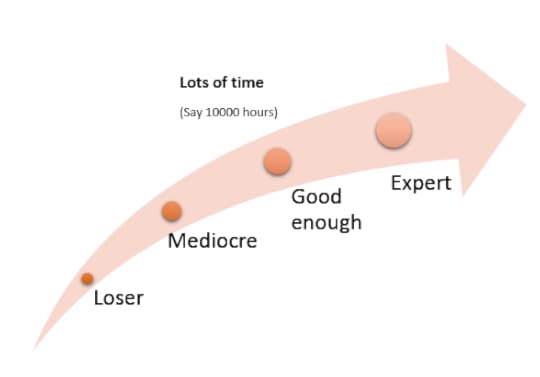
Why Experts Exist
Leaders and followers. Wolves and sheep. Bosses and employees. Entrepreneurs and bureaucrats. Experts and laymen.
Have you ever stopped to consider why we use these expressions? And why we put them in contrast to one another?
The reason we do this is not only because they reflect how the world looks. There’s a larger, underlying, phenomenon at work: The limited capacity of the human brain.
And this limitation of ours is why we have an unconscious tendency of trusting experts, and sometimes even putting them on a pedestal.
Let me tell you why.
The Paradox of Choice
There’s a book called The Paradox of Choice: Why More Is Less The Paradox of Choice written by scientist Barry Schwartz. The big message of that book is that most people think they like having a lot of choice, but they actually don’t.
The Paradox of Choice written by scientist Barry Schwartz. The big message of that book is that most people think they like having a lot of choice, but they actually don’t.

Sometimes you don’t want more choice. You want less. Perhaps you’d like Martha Steward or Rachel Ray to help pick the “best” groceries for you? Maybe you’d like them to give you a shopping list for some recipes?
Schwartz says that the common notion that, “more choice equals more freedom which leads to more happiness”, is completely false for most people.
Because most people can’t handle having too many choices/options/freedom. It confuses them, and they don’t want to have to think.
Generals, rulers, and powerful politicians have known about this long before it was supported by science. For example, Lenin wrote:
Freedom is a very dangerous thing. We ration it very sparingly.
Smart business people have known to profit by it too. Henry Ford said that:
If I had asked people what they wanted, they would have said faster horses.
And Steve Jobs said that:
A lot of times, people don’t know what they want until you show it to them.
And the reason people don’t know what they want is because they haven’t spent that much time thinking about it.
Because:
1) It’s never been a serious problem to them, so why should they think of it?
2) They have probably never been exposed to the thing/idea/environment, so how could they think of it?
By just the same logic, if you asked the Average Joe about something related to self-development, like what some of his long-term goals are, he probably wouldn’t have a clue.
He doesn’t know what he wants until he’s told what he should want by an expert.
Sound familiar?
That average guy just hasn’t put much thought into improving his life or expanding his options. He’s not thinking long-term at all. He’s busy following typical mainstream advice and jumping through the hoops of society, and with the remainder of his time he watches TV and drinks Coca Cola.
This is the type of guy who gets into self-development and spiritual stuff when he’s 40 , dumped by his wife for being a loser, has a midlife crisis, and finally “sees the matrix”. Then he tells everyone he meets that society has lied and cheated him out of the best years of his life. Someone else is to blame for the fact that he didn’t do any thinking of his own.
You know what I mean.
When People Want Choice — And When They Don’t
Seth Godin says some smart things about experts in his books, Linchpin: Are You Indispensable? Linchpin, Purple Cow, New Edition: Transform Your Business by Being Remarkable--Includes new bonus chapter
Linchpin, Purple Cow, New Edition: Transform Your Business by Being Remarkable--Includes new bonus chapter Purple Cow, and The Dip: A Little Book That Teaches You When to Quit (and When to Stick)
Purple Cow, and The Dip: A Little Book That Teaches You When to Quit (and When to Stick) The Dip.
The Dip.
He says that you want to enlist the help of experts in two kinds of situations:
When it’s a matter of life or death. (rarely).
When you’re really short on time or energy. (Often)
Ok, so there isn’t really much to say about #1. It’s a no-brainer. If your life is on the line you will pay any price to preserve it. You’re not concerned with saving money or energy, because all of it is being poured into saving your life.
But #2 is more interesting…
Because, when you are short on time, the aforementioned “paradox of choice” arises. You don’t want more options — you want fewer options. You don’t have the time or the energy to go through all options.
So what do you do?
You probably look to see what an expert is saying and you take his advice at face value. That is the norm.
When time is low and confusion is high, nearly everyone wants someone else to decide for them.
Then this is amplified by the fact that most people don’t even like making decisions.
Why?
Because either they have weak willpower, or because they’ve already exhausted their willpower and energy for that day, and need to recover.
So, that’s where the experts come in. They save you time, energy, and possibly pain, by deciding for you when you don’t want to decide yourself.
There is nothing wrong with this — as long as you’re conscious of what’s going on. The only sin is ignorance.
The only problem is that most people are ignorant.
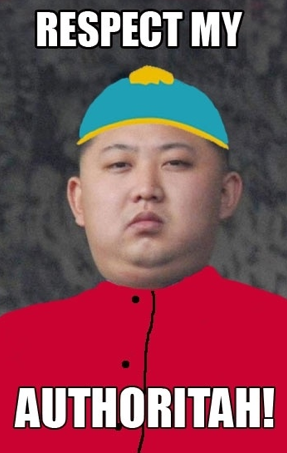
Yeah, you better do what I tell you to do. I am an dictator expert!
“I don’t need to think… I’ll just listen to the experts and the authorities. They know what’s best for me…
…right?”
And on top of this ignorance you can add the fact that most people don’t even like making decisions in the first place. They’ll avoid it if they can — and they can!
That’s why experts have power. The majority of their power lies in their ability to influence other people’s decisions.
…What they should wear, eat, buy, think, read, etc.,
This is why Napoleon Bonaparte said:
Nothing is more precious than being able to decide.
Quick Recap: Why People Want/Need Experts
Because of the limited capacity of the brain. To narrow down choices and simplify things.
In life or death situations
When time or energy is short
If they don’t like making decisions (few people do)
Alright, we’ve now cleared up some of the reasons why experts are popular.
We’ve also cleared up why you’d want to become an expert: To gain status, influence, and power — which can result in making a lot of money, if used intelligently.
Now, let’s take a look at how you can be “good enough” and still get the same benefits as most experts.
Don’t believe me?
Does it sound too good to be true?
Don’t jump to conclusions yet.
How to Get the Same Benefits as An Expert, But Faster and With Less Effort
The other day I was carrying an awkward, big-ass heavy couch. I carried it out from one apartment building into another apartment building. And then I couldn’t get it into the damn elevator. It was annoyingly close, about an inch away from fitting!
It was extremely irritating because I had to go back with the couch — mission failed.
The reason the couch didn’t fit was because the elevator door was designed in a “stylish” (idiot) way that took up extra space. The architect who designed it was a fucking dumbass who cared more about making a cool door than he cared about making a convenient elevator.
This immediately made me think about the book The Fountainhead, Centennial Edition Fountainhead, by Ayn Rand. Because that’s one of the main themes of that book…
Fountainhead, by Ayn Rand. Because that’s one of the main themes of that book…
…but the book also says some very smart things on the topic of influencing people:
…As the summer months passed, as his list was exhausted and he returned again to the places that had refused him once, Roark found that a few things were known about him and he heard the same words –spoken bluntly or timidly or angrily or apologetically –”You were kicked out of Stanton. You were kicked out of Francon’s office.” All the different voices saying it had one note in common: a note of relief in the certainty that the decision had been made for them
…a note of relief in the certainty that the decision had been made for them.
In the case of this quote, the decision was made using social proof. And this is the most powerful way of influencing people’s decisions.
How does it work?
People base their decision off of the judgment of other people — especially the judgment of people they look up to, or experts.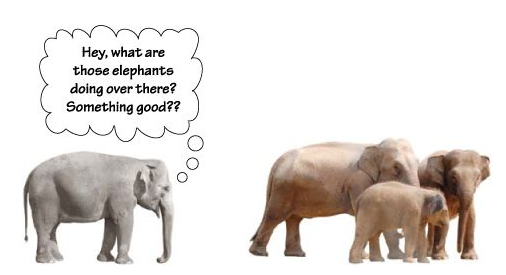
But listen, here’s the thing: Experts sometimes have social proof, but you don’t need to become an expert just to get it!
If you appear to be chosen by others, you can get a similar kind of influence — a similar power — that the expert has…
…without you having to put in 10000 hours to get a fancy doctorate degree or some other bullshit like that.
Let Me Give You the Marketing Perspective
Al Ries and Jack Trout are two very well-known marketing gurus. They’re most famous for coining the term positioning.
Positioning means having a specific association in the mind of your target audience. In plain English this means: How people see you.
Guess which is the best sort of positioning that you can have?
Best as in most profitable, that is…
Is it to be seen as an expert?
Close, but no cigar — guess again.
Ries and Trout say that the best positioning is to be seen as being popular.
NOT being an expert, not being the best. But being popular.
So, even if you were the world’s foremost expert in some niche, you still wouldn’t influence as many people, or make as much money, as the most popular guy in that niche would.
[Note: And let's take it further. You don't even have to be the best. In marketing perception is reality. So, it doesn't matter if you actually are the best, all that matters is whether people believe you are, and associate you with being the best at something. But, even if you were the best, it still wouldn't be as profitable as being perceived as popular would be.]
How crazy is that?
Not only do you NOT have to actually be the best, but you don’t even need to be perceived as the best.
You only need to be perceived as being POPULAR.
That’s it.
You think I’m bullshitting you?
I’m not…
…and this isn’t just true in business or marketing. This is a general principle that can applied to nearly everything.
Think about it:
Nearly everybody buys Coke over Pepsi, despite the fact that blind test experiments show that people actually prefer the taste of Pepsi.
It’s not necessarily the most ripped, rich, well-dressed, and successful guy who gets all the girls in the club. It’s the guy who’s there with a bunch of other girls and appears to be popular and fun.
It’s rarely the candidate who looks best on paper that gets the job. Employers will nearly always pick the candidate who has a personal connection with someone else who works there.
That’s the awesome power of having some relevant social proof — and being perceived as popular.
So, if you can combine that popularity with being “good enough” in a couple of different areas of your life, you can still get the same results as the expert, without having to put in those proverbial 10000 hours of hard work.
Situations Where Most People Think They Need an Expert — But Really Don’t
You could say that 90 % of people want simple and ready-made products and the other 10 % like customization, and having more choice.
This is why Apple computers sell so well. Because the 90 % “just want their damn computer to work”.
Remember, this is part of the “Paradox of Choice” phenomenon I told you about before.
Most people don’t like choice since they don’t want to — or can’t — handle it. They’re busy processing other information. And due to energy limitations (or untrained brains) they want to avoid any new choices…
…because having a choice implies having to make a decision, and making decisions requires energy and willpower — that they don’t have. Point being: In certain situations people don’t like to think. They’d rather listen to an expert.
The problem with this is that most people don’t know this. They don’t make the distinction between,
“I don’t want to do this”
vs
“I can’t do this myself“
And the result of this is? That’s right…they give away power to experts at times when there is no need for it. And they are more likely to be influenced by social proof and look to do the popular thing.
This is why people follow crazy trends. This is why old ladies and middle-aged men have bought yoga pants that they look horrible in.
Here are some typical examples where people take advice they often don’t need:
Doctor appointments, drug use, and medical advice
Gym and fitness
Financial investments
Business and entrepreneurship
Advanced technical stuff
…Just to name a few.
Can you think of any other ones?
How Experts Take Advantage of This
The thing is that you could handle most of these things yourself, if you wanted to.
Sometimes it makes sense to listen to the expert, or look at reviews and see what’s popular, and so on. It makes sense IF — and only if — after having thought about it, you determine that the gains outweigh the losses.
But my point is that…
You rarely need an expert to help you decide. It’s just that most people have been indoctrinated to think that way.
Experts usually take advantage of this situation and try to make as much money off of you as they can. Instead of benevolently looking out for you as a client, they try to cheat you.

“Mirror mirror on the wall, who is the financial expert with the biggest balls?”
Take the financial sector for example. It’s more or less a complete fraud. They dress up half-wits in nice suits and train them in salesmanship. These half-wits then talk you into getting an index fund, and then proceed to steal your hard-earned money through yearly placement fees.
Do you really need an expert to place your money in an index fund?
Hell no.
You could do the same thing yourself in an hour, and cut out the middleman.
But of course the financial person will tell you how much you need him, and how your investments will dwindle unless he looks over them (he won’t).
The financial sector is one of those examples where you can be just “good enough” and you’ll still do as well as most experts. Because hardly anyone beats the index consistently without having huge sums of money.
So your time is probably better spent doing something else.
Now, let’s talk about the type of situations where you definitely want to be an expert…
When You Want to Be an Expert: The Superstar Effect
The Superstar Effect is at play when there is a disproportionate reward to be gained by being the very best at something. When it’s “winner-takes-all”. Good examples are superstar celebrities and athletes — hence the name.
3 different examples of the Superstar Effect:
#1: Lebron James, Cristiano Ronaldo, and Roger Federer earn millions upon millions of dollars a year. But what about that guy who came in second? Exactly… You don’t even know his name. And, more importantly, he doesn’t get the endorsement deals. That’s where the money is.
#2: Vanilla ice cream consistently outsells chocolate — and every other flavor — many times over in almost every country.
#3: The top blockbuster movies outsell the second or third most popular movies many times over. Compare Avatar to the other movies premiering at the same time. According to Wikipedia, Avatar grossed $77 M its opening weekend. At the same time the second and third most popular movies that weekend probably didn’t earn more than $5-20M.
Can you think of any other good examples?
Anyway, the Superstar Effect does NOT apply to self-development.
So there is no incredible gain to be had by memorizing all of Tony Robbins’ books.
When The Superstar Effect is NOT at Play
Let’s take socializing/being charismatic as an example. There is no such thing as a Superstar Effect there, unless if you’re a Hollywood Celebrity.
And you’re not.
So if you want to be someone who’s interesting and entertaining to be around you just need to be cooler than the average person.
And you WILL be cooler than the average person if you’re “good enough” at a combination of things.
Now, let’s talk about pickup, because there are a lot of young guys who think they need to be great at that. They think they need to be expert pickup artists.
…and that’s WRONG.
To pick up a woman in a club, you simply need to be cooler — more interesting or fun — than the other guys in that club. And not necessarily all of them.
Why?

You don’t need to dress or look as nice as this Casanova guy. You just need his girls to get some social proof and seem popular.
Because you’re only going to be compared to the other people in that same environment. The girl is not going to compare you with Brad Pitt. He’s not there. But Bob, the fat slob is. And you’re looking pretty cool in comparison to him.
All it takes is being “good enough”. And this is often the case for women too, although looks matter much more as a woman.
In both cases, there is no need to become an expert at pickup, dating, or whatever you want to call it. Because most people will settle for what they get — and they don’t know what they want until they get it.
There is no Superstar Effect to be had by becoming “the best person in the world” at picking up women, or by flirting with men.
Because if you’re doing these things you’re not competing with the whole world. Only with the other people in the same environment. It’s all relative to your closest surrounding and who you’re being compared to.
The smart thing (in terms of ROI) is to just be “good enough” and then create some social proof and leverage that so that you’re perceived as being popular.
That’s a better use of your time.
When Being “Good Enough” Works Even Better Than Being An Expert
They say that to become an expert at something it takes 10000 hours of work.
They also say that to become an expert you need to make all possible mistakes in a narrow field of knowledge.
That may be so. But most people don’t want to pay that price — most people don’t want to be experts. Most people just want to be good enough.
…And if we’re to listen to Harry Beckwith, author of Selling the Invisible, that also works surprisingly well in getting the attention of other people when it comes to marketing an intangible item, such as your expertise/competence.
If you try to position yourself by saying that you’re the best in the world at something, you’ll instantly make people think: “I doubt it.” and they’ll become skeptical, unless you have a Nobel Prize or other impressive credentials.
So unless you are 100 % sure that you really are the best, you shouldn’t do it.

Don’t say you’re the best unless you’ve got cool credentials — like this arcane diploma.
But if you just say that you’re good, great, or better than 80 % of the rest, and add in some other benefit, then you can still market yourself and your personal brand successfully!
Unless it’s one of those cases where people want experts only, like in life or death situations. Saying “I’m Dr Bob, the decent but friendly brain surgeon”, won’t work.
When Being Seen As an Expert Can Be a Disadvantage
People are going to have a much easier time understanding you and identifying with you when you’re just “good enough” at something.
Because then there’s typically a lower risk that you suffer the curse of knowledge. Meaning that you don’t confuse laymen.
When you’re “good enough” at more than one thing, you can explain things in a way that other people can understand. Believe me, this stuff comes across in your communication with others.
But if you become an expert most people will not identify with you as easily. They’re likely to put you on a pedestal, or they may secretively become jealous and dislike you — although they will probably take your advice.

This is taken from the website of a semi-famous expert doctor. He targets normal people. Do you think they understand this? This is the curse of knowledge at work.
How (smart) Experts Deal With This
Most people don’t identify with multimillionaires and elite people. They can’t comprehend that lifestyle. So, how do smart elites try to deal with this?
They’ll downplay their status and try to seem more “ordinary” than they really are.
“Me? I’m just like you! I go to church just like you do. I always contribute to my community and help out in the soup kitchen. And I eat junk food, like you do. Why am I a billionaire? Who knows, I just got lucky! I just did what I loved doing and with the help of God things worked out.”
Being identified as ordinary — and being likeable — is probably the single most important characteristic required to be a successful politician.
Because if he’s not likeable, he won’t be picked by the masses. The masses care more about liking the candidate and about being entertained, than they care about how the country is run. It’s always been like that.
That’s why Romney lost to Obama. (not that I was pro-Romney or anything)

Obama was more likeable than Romney
Credit: www.RohitBhargava.com
I don’t watch TV much. But some time ago I watched the entire series House of Cards. It’s the best TV series I’ve ever seen, so I’m not too unhappy about that decision.
The main character in House of Cards is Francis Underwood, played by my favorite actor: Kevin Spacey. Underwood is a hyper-Machiavellian vice president who’s scheming to become president — and he’s completely ruthless.
He doesn’t even shy away from killing people…
…that’s how pragmatic he is.
He will pay ANY price to accomplish his goals
Yet, for some reason, there are scenes where he plays video games and gets high. This shit nearly ruined the series for me.
Then it got me thinking…
Why was that scene shot?
Two reasons:
1) To help the typical male viewer identify more with Frank Underwood by thinking…
“He’s just like me — I play video games and get high too. So by association I can also become the vice president!”.
2) An excuse for product placement and to earn Netflix money.
Other Ways of Getting the Benefits of Being An Expert Without Putting in 10000 Hours
Ok, so social proof is the first, and probably most efficient way you can hack the system and get the same influential effect as the expert.
Here are a couple of other strategies/things you can do to gain authority and influence.
Write Books on a Topic
There are two ways you can do this. The first is the typical — serious — approach to it whereby you strive to create a killer book. The second way is much easier — and anyone can do it — whereby you go for quantity over quality and strive to create as many books as possible to make you seem like an expert.
[Note: Here's how you pull off #2.
You decide on a topic for your book. You divide it in 10-12 chapters. You come up with good headlines for the chapters. Then you record yourself talking about each of these topics until the book is finished. Then you transcribe it for cheap and hire a decent cover designer to make it look cool.
The reason you can pull this off so quickly is because you speak many times faster than you write. So, if you've got a lot of experience with something you can easily create a book like this in a day.
Use this strategy at your own risk. It could be useful for certain things, like getting PR for yourself or quickly creating the credentials for becoming a professional speaker: "Dear audience, I now welcome Doug Douglass, author of 10 books on plumbing."
...But at the end of the day you never want to do this if you want to play in the big leagues, because the books you're putting out will be shit. If no one reads them, that's not a problem. But if someone does, it reflects poorly on you.]
Give (free) Speeches (and film it)
This is a sure shot way to show off your knowledge and expertise. If you’re already a well-respected professional at something this should be easy for you. If you’re not, you should start small and seek out events, universities, high schools, etc.,
Personally I want to give 1-2 TEDx talks before 2014 is over, and a TED talk before I’m 30.
Make Yourself Visible (and show off your skills)
There are many ways you can do this, but they all take a lot of time. Here are a couple of examples:
Create a website/blog dedicated to sharing (and showing off) your knowledge on a certain topic
Join a popular forum related to your niche and start answering people’s questions. Eventually you’ll stand out
Make a conscious effort to help successful people (for free) with their projects, and cash in by becoming friends with them, or by getting referrals
Can you think of any other ways?
Is it Worth it Becoming An Expert?
At the end of the day, you gotta ask yourself whether you want to become an expert — or not.
If you do, that’s awesome.
Just make sure you think it through first, because it might be a waste of time depending on the reason you’d want to become an expert.
You could “hack” yourself to getting those same beneficial results much faster, without putting in those proverbial 10000 hours.
Think about it.
Sometimes you want to be an expert — the very best. Especially if the Superstar Effect is at play.
Sometimes — most of the time — being “good enough”, building relevant social proof, and being someone who’s likeable and easy to identify with is even better.
It depends on the context.
It depends on your goal.
It depends on who you want to attract.
And being “good enough” still isn’t easy.
Most people are at best mediocre at many things.
My strategy is to become “good enough” at many things — and then we’ll see.
What about you?
Do you want to become an expert?
Photo credit:
PS:
The site may be down for maintenance or look strange in the coming future. It is being upgraded and worked on.
The post The Secret To How You Can Get the Benefits of Being An Expert Without Putting in 10000 Hours appeared first on Startgainingmomentum.
June 26, 2014
9 Things You Need to Know to Unlock Your Natural Talents & Succeed in Life (Must-read advice if you want to be the best!)

The Oracle of Delphi said: “Know Thyself.”
I say: Learn what it is in your nature to do, and learn how to do it well.
And that’s exactly what you’re going to learn how to do in this 4500-word article. So sit down, block off 30 minutes of your time, press f11 on your keyboard for immersion, and prepare to have your mind blown.
Repeatedly.
Because we’re going to answer most of the common questions you might have — or have thought – about the role your genes play in determining how successful you become.
Here are the topics we’re covering:
1. Are You Limited By Your Genetics?
2. When Do Your Genes Really Matter?
3. Start Playing to Your Strengths And Build On What’s Already There
4. How to Use Your Natural Talents
5. What Your Natural Talents Mean for Your Career
6.“How Do I Find Out Where I Have a Natural Talent?”
7. What if Your Natural Talents Still Aren’t Enough to Succeed?
8. How to Find Your Supplemental Activities
9. We’re All Different — Therefore We Must All Act Differently (to Become the Best)
And a few other things too.
Let’s begin with…
1. Are You Limited By Your Genetics?
You always hear some people talking about why they can’t do [insert cool thing] because they’re too [insert genetic flaw] or not enough [insert genetic benefit].
Is this really so?
I’d say: Nope.
Most of the time, the people in question simply don’t want to win badly enough.
They aren’t hungry winners. That’s why you never have any real sympathy for their suckiness — because they’ve already surrendered to hopelessness.
You see, these people are in a state of learned helplessness.
The way of getting over that, is by distinguishing between what is in your control, and what isn’t. Most people underestimate how much control they actually have over their lives.
You know those quotes about how “you’d be astounded if you only knew your potential” and how “your greatest fear isn’t that you’re powerless, but that you’re powerful beyond measure”… (Yes, they’re corny, I know.)
But, guess what?
They’re closer to being true than they are to being false.
And the reason for this is because the brain is a lazy bastard that just wants to take it easy…
…And avoid taking responsibility.
Take Responsibility — Because You CAN Fix Most Things
You know…
… During my teens, if I had listened to the advice of various doctors who told me that there was nothing visibly wrong with me, and that I had to live with whatever breathing problems I experienced at that time, my life would SUCK today.
My life would also SUCK today if I had listened to the explanation I got from another doctor, roughly two years ago.
That doctor told me that I was just “stressed out and having problems acclimatizing myself to a new country”…
…when I was having problems getting an erection, were getting seriously bloated, and had severe brain fog — despite the fact that I was in excellent physical shape at the time.
Good thing I didn’t listen to that dumbass.
In both of those cases, had I listened to — and trusted — the advice I got, I would’ve given up my personal responsibility.
But, I didn’t listen to their advice, and I didn’t feel helpless.
Not even for a second.
And that’s why I systematically beat the crap out of both of those problems.
Those doctors gave me 30 minutes out of their time, with zero emotional investment, and thought they had me all figured out. And they wouldn’t even listen to my input:
“Oh, you’ve been to Google have you? That’s the worst thing you can do because then you’ll just start seeing all sorts of pseudo symptoms. No, look here young man, you can only figure this out if you’re a real doctor.”
Of course they were wrong. Dead wrong. The problems I had were NOT EVEN CLOSE to their diagnoses.
Why am I telling you this?
Well, because I want you to understand that your body and brain can be improved in a big way...
…And you should not settle for anything less than being in excellent health and having an adonis-like physique.
You cannot change everything, but you can change most things…
…And the things that most people think are determined by their genes or by external factors rarely are.
For example:

Want to control your brain and body?
Step #1: Don’t eat this crap. Minimize sugar and additives. Avoid unnatural and highly processed foods that mess up your hormones.
Your stomach health is mostly under your control.
Your hormone levels are mostly under your control.
Your mental focus is mostly under your control.
Your emotional reactions to the things that happen are mostly under your control.
And so on…
These are all things that you can influence, if you want it badly enough.
It’s your job to frequently ask yourself:
“Is this something that is within my power to control?”
2. Situations When Your Genes Do Matter
You can control most things, as long as you get your brain to agree with you, and snap out of learned helplessness.
At the same time, I don’t want to get too woo-woo-rah-rah-motivational on you here, because…
…there ARE times when you can’t — or can barely — influence your circumstances.
The general principle is this:
If you have a serious disorder, or a genetic disposition, that is counterproductive to your goal you will not be able to get the same results that the typical person gets.
[Note: Having a genetic disposition means that you're naturally inclined towards some certain behavior or state of being. Genetic dispositions are like building blocks that combine to create natural talents or weaknesses.]
Let me give you a couple of extreme examples of this principle:
If you’re highly obese, skinny-fat, or 7 feet tall and skinny as a twig, you’re not going to look like a bodybuilder anytime soon. It could happen eventually. But it won’t be nearly as easy as it would be for a guy with a normal physique. Deal with it.
If you’ve got Aspergers Syndrome, or something like that, you’re not going to become the most charismatic person in the room. So learn to tell some funny stories instead. Deal with it.
If you’ve got ADHD you’re not going to have an easy time learning things the traditional way. You’ll have to create your own framework for learning things. Deal with it.
Are you with me?
In these situations you’ve only got two options. You must choose one of them. The sooner you choose, the better.
You can either:
1) Stick with what you’re doing, accept the fact that you have a disadvantage relative to other people, but do it anyway because you want to do this thing badly
Or you can:
2) Stop doing whatever you’re doing, and focus your limited time and attention on the things you’re naturally talented at instead
There you have it.
You either accept that you can’t be the best and do a thing anyway, or you stop doing it and do something you CAN be the best at.
Guess how many handicapped people have become the world champion at a sport, excluding the Paralympics?
As far as I know, only one.
And that was a guy who lost his legs and went on to become a champion at arm-wrestling, which I don’t count because I don’t consider it to be a serious handicap.
…So none!
Because it’s simply not possible.

Arm-wrestling without legs doesn’t count as being handicapped.
Not in highly competitive areas like sports.
That’s the harsh truth — and it’s a harsh truth that some people refuse to face.
For example…
A few month ago I was at a seminar-type event for aspiring entrepreneurs. There was a middle-aged guy who gave a 10-15 minute long speech. This guy had run three different businesses over the course of eight years. He wasn’t making a lot of money, but he seemed pretty content.
His speech was a woo-woo inspirational speech celebrating all his failures. The speech did not have any substance. It wasn’t actionable at all.
Nor did it have any interesting content — except for one piece of trivia he kept repeating: The 10000 hour rule.
The 10000 hour rule was his religion. He was completely convinced when he said:
“You can succeed at ANYTHING if you put in 10000 hours. Anything is possible as long as you practice for 10000 hours and become the best in the world!”
I spoke to this guy afterwards, and he was really nice guy. But his advice was HORRIBLE.
Let me ask you this:
What do you think would happen if someone in that audience took his advice to heart, and started “putting in their 10000 hours of practice” at knitting…
…granted that they wanted to achieve the goal of starting a successful company and making lots of money?
I’ll tell you what would happen, guaranteed:
That someone would be in for a rude awakening a couple of years down the line.
[Note: Knitting is a bit of a farfetched example, because it's not a genetic disposition, it's an activity. But, it's an activity that is counterproductive to building a business. And, we'll return to this example later, and it'll make more sense.]
The better advice would be to…
3. Play to Your Strengths (Natural Talents) And Build On What’s Already There
It is easier to build strong children than to repair broken men.
―Frederick Douglass
Among successful managers it is a well-known best practice that if you’re looking to hire a new employee, you’re better off hiring people that display natural talent at what the role requires…
…than you are by hiring someone who’s not a natural talent, even if this person has a ton of experience. (Good HR people can spot talent. Bad HR people can’t.)
This has been known for years and years. I learned this when I read some of Peter Drucker’s principles a while back. Drucker mentions Xenophon as being one of the first “managerial scholars” to understand this best practice. And Xenophon lived over 2000 years ago!
Still, this is not well-known among most people, including managers.
Elkhonon Goldberg, one of the world’s biggest experts on neuroscience, writes in his (excellent) book The Wisdom Paradox: How Your Mind Can Grow Stronger As Your Brain Grows Older The Wisdom Paradox that he often gets asked by business publications for managerial best practices.
The Wisdom Paradox that he often gets asked by business publications for managerial best practices.
And guess what?
He is of the same opinion as Drucker and Xenophon, the difference being that he bases his reasoning on neurology, and not on case studies about companies or managers.
Drucker and Goldberg are equally correct — they are just using different explanations for the same underlying phenomenon.
And what is this phenomenon?
That it’s better to build on what already exists, than trying to create something from nothing.

Consider your life a diamond in the rough. You have a limited amount of time and resources to sharpen this diamond, and if you don’t use your resources well, it may NEVER end up becoming truly flawless.
The person who is naturally talented at the job is like a diamond in the rough that needs to be sharpened a bit to become excellent. This person just needs some practice, and an experienced mentor, to help bring out that excellence.
But the second person — despite having years of experience and being moderately competent — is not going to improve much further. Even with the help of a skilled mentor.
So, the better choice is to hire the first person.
Because, even if the second person potentially could become as good as the naturally talented person, the company can’t afford to wait that long.
Their time, money, and other resources are limited.
And guess what?
You are no different from that company.
You don’t have all the time or money in the world.
So you better decide what you’ll become excellent at as fast as you can.
4. How to Use Your Natural Talents to Win
Would you say that a person who is extremely naturally talented at something will become successful?
Most people will say:
“Yes, and it’s so unfair!”
I say: Not necessarily.
There are a lot of naturally talented and intelligent people who never enjoy more than a mediocre amount of success.
Why is this?
Because they conform too strongly to the norms of society.
They do things that are considered socially correct, instead of listening to their intuition. They listen to people telling them what to do, instead of following their own ambition.
So, they end up working what we today refer to as “normal” jobs.
And do you know what the problem is with this?
I’ll tell you exactly what the problem is:
The problem is that few people are a perfect genetic match for most normal jobs.
They’re squandering their natural talents.
They’re NOT playing to their strengths.
They’re going against their own nature…
…and he who fights his own nature, is a fool.
5. What Your Natural Talents Mean for Your Career
Most people don’t think about it, but a lot of professions limit their potential for long-term improvement.
Why is this?
Because after a while, there’s a high risk that you stop learning new things at the job, and, as I said in “75 Practical Tips“…
…THE major competitive advantage that humans have, relative to other animals, is a superior ability for learning things.
In Nicomachean Ethics, Aristotle wrote that:
Man has “growth” in common with plants
Man has “instincts” in common with animals
Man has “reason” alone. Therefore he should devote his life to reason.
[Note: "Reason"= The ability to choose your actions rationally.]
I go one step further than Aristotle by saying that…
…growth actually comes from practicing reason. You do this by learning and implementing new things.
As a result of learning new things you gradually become more competent. You grow past limitations. Your range of options at any given moment increases and you become freer.

The more you improve your “reason” by learning new things, the more you grow, and the more you know.
And when you know things, your range of options increases.
Black = unknown territory,
Grey = things you already know representing an option you can choose,
White = options you can imagine, but don’t yet know from experience
Another way of looking at it is this:
The human brain has a disproportionately large prefrontal cortex compared to all other animals. This is no accident. It is the result of having learnt a lot of complex information over countless generations.
What does this mean?
It means that you’re meant to learn new things and challenge your understanding, continuously.
That’s the reason why you have such a highly evolved prefrontal cortex.
Learning is a part of your biological imperative.
…And what’s a biological imperative?
According to the Wikipedia it is:
“Needs of living organisms as required to perpetuate their existence.”
Some people will say that only air, food, shelter, sex, and companionship are biological imperatives.
I disagree. Learning is at the very root of the evolution of our species. Especially so in modern society.
All the best human beings have understood this. They have prioritized learning above everything else. Benjamin Franklin lived like a pauper for years as a young man — and STARVED — just so that he could afford books and educate himself.
Having said that,
Does this mean that you should refuse to get a normal job?
Absolutely not.
It just means that you should think of your personal development when you decide on your career. Especially so in the long-term (5, 10, 15, 20, 30, 50 years).
You should NOT be working a monotonous job longer than you need to.
The only people who should be working those jobs — and usually like working those jobs — are the people who forever want to take orders from someone smarter than them.
And that’s not how we roll here at SGM.
Because…
…We understand that the people who become truly successful are those who:
Work with — not against — their natural talents, and
Prioritize learning, self-education, hard work, and discipline
I’m talking about people like Albert Einstein, Arnold Schwarzenegger, or Stephen King.
Those guys were not just naturally talented at their crafts, but they also busted their balls to succeed.
They prioritized ruthlessly and put their work first…
…and they took risks that most people wouldn’t dream about taking. So of course they had success.
“No, they were just lucky!”
Sure, luck played a part in it. But when you combine those things, you will get lucky sooner or later.
Can you be that lucky too?
Yes you can.
Start by asking yourself…
6. “How Do I Find Out Where I Have a Natural Talent?”
The simple formula for how you become successful — and eventually elite — is by:
Finding out what you’re naturally talented at as early as you can in life
Then practicing that thing A LOT.
(This means coming up with ways of putting that talent to use as much as you can. Like finding the sort of job that allows you to keep practicing your talent, while other people get “normal” jobs.)
Eventually you become elite. And can enjoy the fruits of your labor.
It’s not exactly a get-rich-quick formula. But you’ll find that nearly everyone obnoxiously successful have followed it.
But how do you find your natural talent to begin with?
Think about it…
… During your life, what have been some of the things that you’ve effortlessly excelled at while most others have struggled to reach the same results as you got?
If you can find a couple of those skills or activities, you’re probably sitting on a natural talent. And that’s what you should devote your time to becoming excellent at.
These are the things where you should be putting in your proverbial “10000 hours” of practice.
Another way of identifying a natural talent is this: Think about an area of your life where you have been willing to take more risks than other people.
Because….
Where there is tolerance for risk-taking, pain, or embarrassment — all things you’re wired to avoid — there is usually natural talent.
Think about it…
…You wouldn’t want to risk failing, getting hurt, or losing face unless you believed you had something to win, right?
And your brain intuitively operates from this very assumption. That’s why you were willing to take those risks. Because you believed that success was possible.

Because your brain was trying to help you unlock that natural talent lying dormant in you.
7. What if Your Natural Talents Still Aren’t Enough to Succeed?
Guys like Mike Tyson, Usain Bolt, and Tiger Woods have had natural talents that have single-handedly made them rich and successful.
You probably don’t.
Now, I’m not saying that there’s a boxing gene, a running gene, and a golf-swinging gene. But what I am saying is that these natural talents easily translate into money-making skills.
You see, sports and athletic skills are simple — in terms of theoretical complexity — compared to most other modern ways of making money.
Some people may disagree and say:
“No Ludvig, you’re wrong. You have no idea how hard it is to be an elite athlete”
And I’m not saying it isn’t hard — because it IS hard.
That’s why most professional athletes take steroids and use other dirty tricks. Because the competition is fierce. This is why it’s very hard to become an elite athlete.
But sports are still simple, because they are not complex.
Any retard with functioning arms and legs can be taught to jump, run, swing a club, or punch another person. Those are simple body movements. I’m not saying the retard will do a good job, but he can perform the tasks.
Anyone can do individual sports, but to be truly elite at it in this day and age you need superior genetics (combined with hard work and steroids).
Since sports are simple activities they open up a lot of competition, and only a few people can make it their full-time profession.
So, let’s talk about more Complex activities instead.
Because that’s where the money is to be made for people not fortunate enough to become elite athletes.
Most work that requires a university degree is more or less complex. And while most people can get a university degree and can get the jobs that come along with it, only a few of those people do those jobs well (and earn a lot of money).
Because like I said before: Most of them are doing work that doesn’t involve their natural talents.
To better understand how to get really good at complex activities, let’s look into…
Creative Work
Any kind of creative work is complex — and there is a varying degree of creativity in most jobs.
But here’s the kicker:
Anybody can be taught basic creative skills like:
Writing,
Drawing,
Photography,
Programming,
Web design,
…etc., but only a few people can do these things really well!
Why?
Because those creative skills are only conduits for channeling creativity. They are only languages used to express yourself…
…and just because you know how to speak that language well, does NOT necessarily mean that you have something to say.
For this reason, a great programmer can be hundreds of times as productive (and paid in proportion) as a mediocre programmer.
The great programmer is genetically disposed to some form of creativity. He then uses programming as the language to express himself and his ideas. Because of this he’s able to come up with new and revolutionary software solutions.
His manager couldn’t just tell him, “Do these things and come up with a revolutionary new idea for me, Bill”, because creative work is highly complex.
And what about the mediocre programmer?
He only checks for errors and does what he’s being ordered to do. He can’t do anything else. He’s not creative.

There’s a big difference between being creative, and having learned a basic creative skill. You don’t know if you’re creative until you find a “language” for expressing it.
You could also say that the great programmer uses programming as a supplemental activity to support his natural talent for creativity.
Let’s revisit the horrible advice of that entrepreneur I listened to
What if….
…you put in 10000 hours at practicing knitting?
Could that make you rich, granted that you had a natural talent for knitting?
No. Knitting is not going to make you rich — at least not in itself.
But what if you mixed it with something else?
Then it would be possible to make big money, because it would be be supported by supplemental activities.
Let me give you a few examples of what I mean…
8. Develop Your Supplemental Activities
A couple of months ago I was at a Toastmaster’s event. Toastmasters is an organization devoted to public speaking.
At the event was a woman who held a seminar. She had won some kind of world championship in public speaking.
She was a great speaker. But her content sucked. Big time…
…And she knew it herself. She even openly admitted struggling with the process of content creation.
From an early age this woman had practiced acting and dancing. She had eventually become a professional dancer.
Acting and dancing — both of these activities rely on expressing yourself by using your body.
And as you may know, most of human communication is determined by body language. So, the reason she was a great public speaker was because of her natural talent for expressing herself non-verbally.
But her natural talent wasn’t enough.
To be a “professional public speaker” you don’t just need to be great at speaking.
You need quality content — and lots of it.
She didn’t have this.
So, she’s now developing the supplemental activity of content creation to support her natural talent as a speaker.
When she becomes better at content creation she’ll be able to make some serious money. Because, she is already held in high regard by the kind of people she wants to speak for.
9. We’re All Different — Therefore We Must All Act Differently (To Become the Best)
I am very different from that woman.
I am good at connecting the dots (of information). I have a talent for synthesis. I have been born with a brain that has a very strong pattern recognition. Because of this…
Creating content comes naturally to me.
Analyzing things from different perspectives comes naturally to me.
Finding new ways to use tools or information comes naturally to me.
Being a highly motivated person comes naturally to me.
In fact, I have such an easy time coming up with ideas that it looks retarded to me when people struggle with it, and ask each other:
“What should I say/do/write?”
Or complain:
“But I have no content!”
Because I’ve never had those problems.
I am drowning in ideas and content. But just because I have a lot of content doesn’t mean it’s any good. It’s not good until it’s well-articulated and simple to understand.
That’s why I practice writing and speaking. But these things do not come naturally to me.
They are both skills that I have had to practice a lot. And I must continue practicing them because…
…I need them to support my natural talents. They are supplemental activities to my strengths.
And as you know,
You should always strive to play to your strengths.
So, If You Want to Be the Best You Must…
Rig the game (of life) however you can to get an advantage.
“But that isn’t fair!”
Who cares.
The world is inherently unfair.
You acting unintelligently — and against your nature — is not going to change that fact.
If you play games where other people have the aptitudes and you don’t, you’re going to lose. And that’s as close to certain as any prediction that you can make. You have to figure out where you’ve got an edge. And you’ve got to play within your own circle of competence.
–Charles Munger
So if you want to be the best you must:
Figure out your genetic dispositions. What are you naturally talented at? What are you naturally bad at?
Then make the decision to focus on your strengths, not your weaknesses. Try to avoid situations where your weaknesses are exposed.
If you’re a creative person, you need to find an appropriate “language” for expressing your ideas.
If you have a natural talent for a simple activity (like sports) you will need to outwork everybody else and take more risks than they do (like steroids in sports).
If you have a natural talent for something that’s isn’t simple you will need to learn some supplemental activities that support your natural talent.
If you have natural talents for something that’s complex — well, then you’re damn lucky. Because, to be the best at a complex activity you need to do more than just one thing really well. It’s rare for a person to be positively genetically disposed towards all aspects of a complex activity.
Now that you’ve read this leviathan of an article,
Take a couple of days to let the information really sink in.
Then figure out how these things apply to your own life so that you can…
Build on what is already there and rig the game to your advantage.
Forget about fairness.
Forget about equality.
Forget about following the “traditional path”.
I don’t know what ticket you got in the genetic lottery.
But I do know this: It’s time to quit crying and start hustling. Play the hand you were dealt to the best of your abilities, and to use that hand to your advantage in any way you can.
If you don’t, you will wind up fighting your nature.
…And he who fights nature is a what?
That’s right.
He’s a damn fool.
Photo credits:
PS: Check out the two FREE eBooks I just finished writing!
The post 9 Things You Need to Know to Unlock Your Natural Talents & Succeed in Life (Must-read advice if you want to be the best!) appeared first on Startgainingmomentum.
June 5, 2014
How Studying History Boosts Your Personal Development

Most people know very little about history, and they think it’s boring.
They also think it’s useless:
“What’s the point of knowing the names and dates of this person or that event!?”
There is a point. Actually, there are several.
Studying history is surprisingly useful — and grossly underestimated.
Read on, and I’ll tell you why.
If you’re not already an avid student of history, I’m hoping you will become one after having read this article.
Because, I’m going to show you HOW and WHY studying a bit of history can help you a lot. You don’t need to become a historian or anything, but there are certain things that you should know when it comes to history.
I’ll tell you which ones soon.
Here’s a summary of what we’ll be going though:
Why studying history will boost learning and make you more curious
Why studying history will motivate you
Why studying history is good for practical purposes — like sales, persuasion, writing, etc.
You ready?
Cool.
Let’s start with…
Why Reading History Will Boost Learning and Make You More Curious
Have you ever had to learn something but felt a complete lack of interest?
Yes you have — and you didn’t like the feeling. That’s what school was like.
Here’s the thing, you have predispositions. These are certain things that you’re genetically inclined to be more interested in or talented at. You cannot control this.
But, there ARE strategies that you can use to become more interested in learning things. All of these strategies I’m about to show you have to do with gaining more mental associations. The earlier in life you start building a ton of associations, the easier it becomes for you to learn new things.
Here’s what you do in 4 simple steps:
1. Start by reading easy books on the topic
That will give you an overview and lots of associations. The more associations the better. This will motivate you to read harder books.
2. Read a lot of quotes from great people
Reading quotes from experts is like taking a crash course in the subject.
It is a good thing for an uneducated man to read books of quotations.
Wrote Winston Churchill in 1930, in his autobiographical book My Early Life: 1874-1904 My Early Life. Indeed, Churchill himself, who never claimed to be particularly educated, devoured the book Bartlett's Familiar Quotations : A Collection of Passages, Phrases, and Proverbs Traced to Their Sources in Ancient and Modern Literature
My Early Life. Indeed, Churchill himself, who never claimed to be particularly educated, devoured the book Bartlett's Familiar Quotations : A Collection of Passages, Phrases, and Proverbs Traced to Their Sources in Ancient and Modern Literature Bartlett’s Familiar Quotations and found that it gave him the motivation to study the works of many great historical men.
Bartlett’s Familiar Quotations and found that it gave him the motivation to study the works of many great historical men.
3. Study history and use it as a tool for crafting more associations.
This is a BIG one.
By studying any type of history you will soon form a rich bank of associations. Your mind effortlessly turns these associations into analogies:
The European crisis?.. Oh, that’s like what happened when (insert historic event)
For example, when I read Ayn Rand’s Atlas Shrugged Atlas Shrugged, I came to think that the battle between the Looters and the Men of the Mind was similar to the feud in Ancient Greece between Socrates and the Sophists. If I hadn’t studied history I would not have been able to make that connection — and I probably wouldn’t remember it today.
Atlas Shrugged, I came to think that the battle between the Looters and the Men of the Mind was similar to the feud in Ancient Greece between Socrates and the Sophists. If I hadn’t studied history I would not have been able to make that connection — and I probably wouldn’t remember it today.
On a neurological level, what’s happening in your brain is this: You build up a large web of neural pathways. Kind of like a net. Then when you cast that net out into the sea you can more easily catch things because your net now has hooks in it!
Sea = Information
Catch things = Learn and remember
Hooks = Associations

Why Reading History Will Motivate You
Adam Smith, Frederick Taylor, and to some extent David Ricardo — all economic and managerial philosophers — thought that the best way of maximizing productivity, and thus profitability, was to specialize work tasks.
They wanted to separate work tasks and train each worker into becoming a specialist in one thing only.
This strategy of separating and specializing work was then taken to a grand scale by Frederick Taylor. This became known as Taylorism
Other philosophers, like Karl Marx, thought that it would be more productive to have the workers know a bit of everything about the factory. Because then the workers wouldn’t be as reliant on each other, and they would appreciate the work more as a result of understanding exactly how they contributed to the business.
Marx thought that the worker would become more motivated if he understood the context of his work role and how it helped contribute to the end product.
Remember that I told you history speeds up learning and curiosity by giving you an overview and more associations?
Don’t you think Marx’s reasoning is similar to that?
It sure is. He was onto something there.
But of course, Marx couldn’t prove it because the fields of psychology and neurology were so primitive at that time. They didn’t know this stuff back then. We do now — or rather, we do — but most people do not.
Anyway, what we can learn from Marx vs Smith & Co is that the answer to achieving the greatest amount of productivity probably lies somewhere between both of their arguments:
To train the workers into becoming specialists
while also
Showing them the big picture, their context in it, and why their work matters
So then, this means that the workers need to know as much as possible about the business and what the value chain of the company looks like. The more the worker understands, the more he can appreciate his work. The worker would then realize:
“Ah, I am part of this ecosystem that is larger than me, and my specific role is to produce. My work matters.”

Alright. So what does this have to do with motivation and personal development?
A lot.
Because you are the factory worker.
Your factory is LIFE and your work is PERSONAL DEVELOPMENT.
When you study history you will better understand the context of your life. This makes you appreciate things more, and take fewer things for granted.
The factory worker is like the typical student. None of them know why they’re working or what they’re working for. They just know they’re supposed to do it.
When you’re in school, you have no idea of your context. All you know is that your teacher wants you to learn some information. And when you ask WHY you need to learn this stuff, your teacher gives you some unconvincing answer about how it’s part of the curriculum. And for all you know, the curriculum is decided by some old bearded guy who hasn’t been able to keep up with recent progress in technology, science, or business.
Why is it good for you to learn outdated and time-consuming accounting methods from 200 years back?
No one knows.
Why is it good for you to learn some history?
Because it helps you understand the context you’re in, and it makes you motivated.
If you don’t know your context you will be confused. When you are confused, your motivation is weak. Because you don’t know what you’re working towards.

Why Studying History is Great for Practical Purposes
If you read about successful people you’ll notice that most of them are avid students of history. And not just in their particular field of expertise.
Not only do they study the greats who came before them, but they also study history for other reasons. For example, because it helps them persuade people or to communicate a message more efficiently:
By creating credibility and making your arguments more convincing and believable (backed up with historical facts)
By making people understand easier and faster (with associations and historical analogies)
By creating a meaning and a context for something (by explaining how things led up to this point)
I use history for examples and building a convincing case for what I am saying.
–Nicholas Nassim Taleb
So, if you’re an aspiring writer, salesperson, politician, or just someone who needs to make a persuasive presentation, you should read up on some relevant historical trivia.
It pays off.
Studying History IS Important to Your Personal Development
It’s funny how most people think that history is boring and useless. Because, as you see, they think it’s boring because they don’t know enough about it.
If those people built up more associations, their interest would go up, and it would also help them in other areas of life by speeding up their learning process.
And clearly, studying history is not useless. So they’re just wrong about that.
My advice:
If you’re really interested in something, if you work in a particular industry, or if you are educating yourself towards a certain profession, you should:
Read quotes from the greats (Wikiquote is a good place to start)
Read simple and general books that give you an overview
Read harder books
Study the history of that particular field
Understand the context you’re in to boost motivation
Use historical facts to build your case and persuade people. Draw on relevant historical examples to make your arguments more credible
Over to you:
Do think studying history is useful or not?
Can you think of another reason why history is beneficial to personal development?
Have you learned any interesting historical trivia lately?
Do you know the history in your industry or the history in something else you’re deeply interested in?
Google: 1
The post How Studying History Boosts Your Personal Development appeared first on Startgainingmomentum.
May 25, 2014
Become Someone Worth Helping
 Some people think that the world is out to get them, and that there’s some kind of organized conspiracy going on by unknown bad guys, to keep them from rising up.
Some people think that the world is out to get them, and that there’s some kind of organized conspiracy going on by unknown bad guys, to keep them from rising up.
Are they right?
Of course not.
That’s just something that lazy losers think so that they can feel good about themselves, without having to put in the hard work needed to rise up.
Is the opposite thing true then? That the world is a harmonious place, and that everyone wants to help you succeed?
No, that’s not exactly true either. Even though there’s no harm in thinking that. Always think things that benefit you.
Anyway, the world is not out to get you. But at times, certain people are.
A lot of people are dissatisfied with their lives. Some of these people want the same for you — and will want to bring you down to their level. Because they’re unintelligent, they convince themselves that they can make their own situation better by ruining things for you. The typical example of this would be:
The stupid, angry, guy who goes out to get in fights with other people.
The mean bureaucrat who won’t help you with some small thing, just to spite you.
The bouncer, cop, or exam guard who misuses his position by messing with you for no other reason than to feel like he’s a more important person than you are.
Clearly, everyone you meet aren’t going to be cool and friendly people who want to help you. That’s just the reality of it.
So…
Who Will People Help?
Here’s a basic principle about human nature: We admire the strong and we avoid the weak.
This behavior manifests itself both consciously and unconsciously. We are attracted to the things we think will help us get closer to our goals and improve our “biological value”, and we avoid that which we think will make us weaker.
Consider street beggars. You avoid them, don’t you? Don’t try to bullshit me.
While it is socially correct — in western countries — to help the weak by donating money to charities or giving money to beggars, most people flinch internally and feel uncomfortable about it.
Why? Because we’re wired to avoid weakness.
Or phrased differently: we go where the value is and avoid that which doesn’t have value.
Pretty straightforward, right?

Well, obviously everyone does not understand this — beggars are a great example. They provide nothing of value.
Actually, it’s the opposite: They steal value. Because they’re trying to make you feel guilty. They think you’ll help them if they can get you to pity them.
Does this work?
Nope. Never has. Never will.
Now, even though most people are NOT beggars, they will sometimes use the same lousy mindset. They think that they can get people to help them by playing “the guilt card” or by seeking to be pitied.
Of course, this does not work. As you know, people are NOT attracted to weakness or value leeching behavior.
There’s also another reason why most people won’t help “weak losers”, and it’s super important, so pay attention:It’s called the drop-in-the-bucket effect.
The drop-in-the-bucket effect states that people will not help someone else unless they think it’ll make a noticeable difference.
Let me give you an example: There have been experiments where two different people begged for money. The first person dressed as a beggar and the second person dressed as a business man. The business man was much more successful in his begging because people believed he was serious.
The businessman subcommunicated that he had his shit together. People believed he wanted to help himself, so if they gave him a dollar for a phone call, they knew it would make a difference — because it would fix things for him.
But what if they gave money to the beggar?
It probably wouldn’t make much of a difference at all. Give a dollar to a beggar and you’ll find him in the same spot tomorrow, asking you for another. The root problem would still be there.
So, who will people help?
People Will Help a Hungry Winner
Think of Hannibal Barca, the guy on the elephant in the image up top. He was one of the most skilled leaders ever. He roamed around Italy undefeated for 15 years straight, during a time when the Romans were at their height of power and supposedly undefeatable in combat.
During this time he had all sorts of bad things happen to him and his army. For example, he lost one of his eyes to a nasty infection. He was stuck in hostile territory and never got any back-up (supplies or soldiers) from his own country, Carthage.
Despite all this trouble, none of his soldiers ever rebelled, fled, or committed mutiny. Why?
Because Hannibal understood something incredibly important: How to create a compelling vision.
He supposedly said:
I cannot predict the future and I cannot force any of these men to cooperate with me. But I can tell them how I see it. I can show them my vision of the future — and if they like it they will join me.
Hannibal had a compelling vision of the future — he was a hungry winner. He wanted to conquer Rome and defeat them at their height of power, and he probably would have, if he had received backup at least once during his 15 years in Italy…
…But the council of Carthage didn’t like Hannibal’s ambition. Secretive elites conspired to his defeat. But they did not succeed. Hannibal remained undefeated during his time in Italy.
A question worth asking is: What value is there in having a compelling vision of the future?
And the answer is: Plenty.
One reason that a compelling vision of the future is valuable is because the future is uncertain. And anything that is uncertain or risky is fearsome to most people. Therefore, a compelling vision will help them feel better. And anything that makes someone feel good has value.
Having an empowering vision is synonymous with strength. But you don’t necessarily have to talk about your vision. Embodying it, leading by example, and being a hungry winner is better.
Hannibal Barca did all that brilliantly.
Other Reasons People Want to Help
Just like Hannibal said, you cannot force anyone to help you. The only reason anyone would ever want to help you is because they find value in it.
Sometimes people may want to help you for reasons you cannot even understand yourself. It’s easy to think — or rather unconsciously assume — that other people value the same things you do. But that’s rarely the case.
When Cuz D’Amato, the legendary boxing trainer, decided to mentor the shy and slightly overweight street kid Mike Tyson, he did it for selfish reasons. In fact, he did it for the most selfish reason in the book — the will to live.
…I had no reason to go on. But I have a reason now, because Mike’s here — and he gives me the motivation; I will stay alive, and I WILL watch him become a success, because I will not leave until that happens.
You see, Cuz was ready to die. He was an old man who had lost all interest in living. It was not that he was unhappy or dissatisfied with his life. In fact, he was directly responsible for creating two world champion boxers: Floyd Patterson and José Torres. It was simply that Cuz felt he had done what he wanted to do…
…Until he was introduced to the thirteen year old Tyson and decided to mentor him.
If that hadn’t happened, Mike Tyson would probably have become a felon who would’ve ended up in prison, or at best, made a semi-decent boxing career.
But Cuz decided to help Tyson — because he saw that Tyson was a diamond in the rough. Tyson was a hungry winner.
Become Someone Worth Helping
So there you have it.
People don’t want to help beggars because they won’t even help themselves. So why should people care about them, if they don’t even care about themselves?
You’ve probably seen the TV series Shark Tank, or Dragon’s Den. The entrepreneurs who come to the show to pitch the venture capitalists on the jury — do you think it would work if they sought to make the venture capitalists pity them? Would they get any money or help?
Hell no.
You want people to help you?
Then quit being weak and become strong.
Stop leeching value and start providing value.
People will not help you unless they believe it’ll make a difference. They will not want to help you unless they believe you’ll implement their advice.
Become someone with a strong ambition, someone people want to help. Become a “hungry” winner.
The post Become Someone Worth Helping appeared first on Startgainingmomentum.
May 14, 2014
Free Up Time and Become More Efficient By Using 3 Techniques for Problem-Solving
 I know what you’re probably thinking…
I know what you’re probably thinking…
…What the heck does saving time and becoming more efficient have to do with problem-solving?
Before I tell you why, I want to make a poetic analogy.
Sometimes life is like a maze: you’re navigating through your days without really getting anywhere. There are constantly new problems coming up that need to be solved… Right?
Or is it really so?
Are these problems really “new”?
The answer is: No.
Most of your problems are old news, you just haven’t got ’round to fixing them. And I mean REALLY fixing them, on a fundamental level.
Let me ask you this: How often do you do the same things over and over?
Probably a lot.
You do this because almost all of your behavior is habitual.
But, what if you could pinpoint specifically when and where your current habitual behavior doesn’t serve your purposes?
Well friend, then you’d become a much more efficient person…
I’m going to tell you three simple techniques for problem-solving. The first one involves pinpointing your habitual behavior and it is the most important one. When I say “problem-solving“, I mean everything you encounter that requires making a decision.
So, how do you solve a problem?
It depends on what sort of problem it is.
There are three sorts of problems:
General problems
Normal problems
Unique problems
You should start categorizing the problems you encounter according to these three types, and treat them accordingly. Because if you do, it’ll boost your problem-solving skills. Which will result in what?
–Increased efficiency and more free time.
General Problems: 80 % Focus
General problems happen recurringly. They are by far the most common — and important — type of problem.
General problems are most important to spend your time solving. If you only take one thing away from this article, it should be this.
You solve general problems by coming up with a rule of thumb describing what you will do when the specific problem occurs. A great way of doing this is by compiling a list of daily lessons, preferably in your commonplace.
Daily Lessons
What are daily lessons?
Here are a few examples:
Interesting observations
Important takeaways you learned during the day
How you behaved in a certain situation
The reason we have general problems is usually because we’re not conscious of them. Or we may even be conscious of them, but lack the motivation to do anything.
Compiling daily lessons you overcome both of those sticking points — because it strongly concretizes the problem and elucidates how much of an impact the problems has on your life.
If you write down a few of these lessons each day it will quickly scale. Soon you’ll have a lot of info about yourself and your behavior. It won’t take long until you start noticing a recurring pattern of behavior.
Bingo. You’ve just identified a general problem that needs to be solved!
Here are some examples.
Maybe you find that you’re having trouble waking up in the morning…
Maybe you find that you’re not doing the important and urgent things first thing in the morning…
Maybe you find that you’re becoming tense and tired at a certain point each day…
…And so on.
Generally speaking (no pun intended) if you find yourself writing similar daily lessons over a longer period of time — say 30 days at least — it’s clearly a sign that you are experiencing a general problem.
When you have compiled enough daily lessons you should spend some time — perhaps a few hours — going through them.
Once you have noticed certain patterns, and identified the general problems, you deal with it by creating a rule of thumb describing specifically what you’ll do when it happens the next time. The simpler your rule of thumb the better.
Be sure to:
Write down your rule of thumb IMMEDIATELY.
Keep it nearby and remind yourself of it frequently
Implement it as soon as possible, and as often as you can in a short time span.
By doing this, you’ll quickly turn your rule of thumb solution into a habit.
This will automatize the solution to your problem — and that way you won’t need to deal with as many “new” problems every day.
Normal Problems: 15 % Focus
Normal problems happen once in a while, just often enough for it to be predictable.
A good problem-solving method for normal problems is to use WCCA — Worst Case Consequence Analysis — which works like this:
What’s the worst thing that could happen? (event)
How likely is it to happen? (Estimated probability)
Can I take this risk? (Perceived risk)
Event x Estimated Probability = Perceived risk
Your brain does this automatically actually. But, it helps to think of every once in a while, just to practice.
There is a problem with this method for problem-solving (no pun intended). Depending on the situation you might grossly miscalculate the estimated probability.
Why?
Because you’re very mood-based.
For example, if you’re in a negative mood, you’ll tend to overestimate risks and scare yourself into decision paralysis. And if you’re in a great mood you’ll tend to underestimate risks and feel that everything is possible, sometimes unrealistically so.
However, in my experience it’s a lot better to be delusionally positive and possibly mess up, than being negative and not doing anything.
Anyway, most people tend to overestimate the perceived risk because they’re afraid.
Then there are also other interfering biases. For example, loss aversion is estimated to be about 2.5x stronger than your will to win. That’s a serious issue, because your inherent fear clouds your judgment and destroys motivation.
On the whole, normal problems are a bit tough to deal with in a systematic way.
Unique Problems: 5 % Focus
Unique problems are rare and very hard to predict. They are like black swans.
How do you deal with them?
The answer is: You don’t.
This what most people don’t understand, and it hurts them on two levels:
They worry about things that are unlikely to ever happen. Worry causes unnecessary stress. Stress in turn hurts the hippocampus — the part of the brain responsible for memory function.
They waste time and mental space that could be more productively used for other things.
Another problem is that worried and stressful people are “contagious”.
When you’re around someone who acts in a certain way you’ll often unconsciously mirror that person’s behavior. That’s when you need to be unreactive, because your mirror neurons aren’t helping you at all in that situation.
The best way of “not” dealing with unique problems is by being prepared to face them. You prepare in advance so that you can absorb them head-on. In finance, this is called hedging.
Think of it this way, you could lose your computer in a ton of different ways. It could get stolen. It could get hacked. It could stop working by itself. Someone might spill water on it… And so on.
There’s simply no point in trying to predict all possible ways you might lose or break your computer. So what you do instead, is that you back-up your files every once in a while on an external hard drive. By doing you’re ready for all of those problems when they happen.
Summary: The 3 Types of Problem-Solving
General problems — 80 % focus
General problems are by far the most important ones to focus on solving because you can systematically eliminate them by creating habits and check-lists of best practices/rules of thumb.
Systems create automation and boost efficiency, which gives you more time to focus on other things.
Spend at least 80 % of your time solving the general problems that happen often.
You can do this by writing daily lessons and looking at them once in a while — perhaps once every month. That’s enough time to notice the overall patterns of what you’re struggling with (the general problem). You then sit down, reflect on the observations, and figure out some rule of thumb solutions.
Normal problems — 15 % focus
Normal problems happen once in a while and are possible to predict. But, they are still not worth putting much time into. If you have to do it you can use WCCA — Worst Case Consequence Analysis. Just remember it’s not always that accurate.
Unique problems — 5 % focus
Hedge yourself against unique problems by preparing to absorb them. Live with a bit of risk — and accept it. Don’t obsess over the unique problems, it’s simply not worth the time.
Suckers and neurotics obsess over unique problems.
Don’t be that guy.
Over to you…
Have you got a good system for dealing with problems?
Do you differentiate between problems or categorize them?
Photo Credit: Flickr
The post Free Up Time and Become More Efficient By Using 3 Techniques for Problem-Solving appeared first on Startgainingmomentum.
April 28, 2014
The 11 Maxims You Should Live By
 What is a maxim, you ask?
What is a maxim, you ask?
Simple. It’s a rule for you to live by.
Why do you need maxims?
Simple. Without them you live a weak and undisciplined life, lacking in consistency.
A life not governed by any maxim is a deeply unconscious life that will lead…nowhere.
Below are 11 maxims that will help guide your actions towards a more successful life.
#1 Absorb what is useful; Disregard that which is useless
The first time I ever encountered a maxim was when I started practicing Jeet Kune Do at age 14. At the end of each practice we would recite a bunch of maxims. Out of all the maxims I heard, this was the only one that I truly “absorbed”.
How appropriate.
Jeet Kune Do is actually founded on this very maxim. JDK is the father of modern MMA. Bruce Lee created it by taking all the best stuff from all other martial arts, mixing it together, and creating his own one. All the traditional martial artists got angry at him for doing it. But no one remembers any of their names, while Bruce Lee’s will forever be known as a famous pioneer.
This maxim has impacted my life in a big way ever since. I am a “thief” — and I’m proud of it. I steal ideas from the most brilliant minds. You should do the same.
#2 Your brain is constantly being rewired
And it’s all on you to make sure that it’s being wired optimally. Any time you’re having a negative thought, that’s another repetition given to a corresponding neural pathway. This makes it stronger, and more likely for you to think negatively again.
Is that really what you want?
To consistently have negative thoughts is an indicator of ignorance. A highly conscious person would never hurt himself on purpose by lowering the quality of his most important tool — the brain.
By reminding myself of this maxim, I have eliminated almost all negative thinking. While I might not always be delusionarily positive, I am never negative. I am at worst neutral.
#3 Time is short, you will die soon
This is fact.
At first it’s a scary thing to think about. Then it becomes very liberating.
Death is the ultimate liberator. It’s impossible to say anything about death other than that it happens — without fail.
Death is the ultimate liberator. Life is potentially scary.
#4 Your life is the sum of the narratives you tell yourself

All personal experience is subjective. “Reality” cannot be proven to objectively exist. You can hang out with a friend and look at a rock and both of you can agree that you’re seeing a rock. But that’s not real reality. That’s consensus reality.
The takeaway is this: your life is perceived to be whatever you want it to be — no exceptions. You have a certain amount of control (no one knows how much) over the subjective experience known as your life.
Every event merely is. It’s your responsibility to interpret it in an empowering manner. Crude example: if you’re sad about your grandma dying — that’s your narrative making it seem negative.
All is but opinion.
Your internal dialogue, and how you interpret the things that happen to you, are completely up to you to mentally manipulate in your favor any way you can. Much of Stoicism is devoted to this pursuit.
You can either choose to listen to a disempowering narrative, or you choose to listen to a narrative where you are the champion.
But what if others disagree?
Well, who are others to decide what is real or not?
What authority do they have behind their claims?
No one has a claim on your reality, except you.
Choose an epic narrative.
Choose to have an inner monologue that is delusionally positive and constantly pumps you up.
#5 This too shall pass
Heraclitus, the philosopher, said that change is the only constant. He was right.
Remind yourself of this anytime you’re suffering, complaining, or struggling with the present situation.
#6 Life is about making choices
Time is the most valuable resource. At second place comes willpower.
Napoleon Bonaparte said:
Nothing is more difficult, and therefore more precious than being able to decide…
And it’s true. Willpower, as ascribed to your prefrontal cortex, is the “finite” resource being used to make a decision.
As Napoleon famously asserted, most people don’t like making decisions, and never make an effort to practice their willpower. They are also in the habit of spending it on all the wrong things.
They waste their second most important resource on deciding which TV show to watch. But they don’t use it to build a business, build a body, or educate themselves.
#7 There is a “law” of compounding: Follow it
Just as there is power in compound interest, there is also power in compound experience. It’s not an exact law though, because there’s a difference between compound interest (money) and that of compound experience.
The difference is that it takes forever for compound interest to start producing financial results for the normal person… Let’s say you save $500 on a monthly basis — which you absolutely can if you’re frugal — and invest it in the stock market or a savings account. Your investment then appreciates by 5 % on a yearly basis. If you keep this up for 20 years you’ll end up with $207,729.47.
[Note: You can check this out yourself to make it more concrete…]
And while that sounds like nice chunk of cash, it’s not really as great as it sounds…. Because you’re probably not taking into account that:
1. You’re locking in this capital for 20 damn years (!), and in doing so probably missing a bunch of better investment opportunities.
2. In 20 years from now, your hefty sum of $207,729.47 won’t have the same purchasing power as it does today. Given how much money is being printed nowadays, it’s hard to know how much that amount of money will be worth in the future.
3. The stock market, or your savings account, could potentially crash at any time. Like when Lehman Brothers collapsed and initiated the financial crisis of 2008. If that happens, you’ll be set back a long way, maybe minus 30-100%. If that happens, all your previously compounded interest goes out the window.
So, compound interest is awesome in theory. But not always awesome in practice. At least not if you’re an average Joe starting from scratch hoping to get rich from it in 20 years.
–Experience, however, is safer. It is fully subject to the “law” of compounding:
1. You will learn more, and quicker, if you know a ton of stuff. This is because learning happens mainly by creating associations between memories. If you already have a ton of associations that relate to something, you’ll memorize it almost instantly.
2. If you already have a lot of experience in an area, your brain is primed to see patterns that others cannot see. If you’ve got a lot of experience with business you can see potential business opportunities more easily. If you’re good at picking up girls you can see opportunities for doing that where others don’t. If you’re good at fighting you can easily find openings to strike your opponent.
3. The more you know, the more often you get “inspired”. Einstein said that:
A new idea comes suddenly and in a rather intuitive way, but intuition is nothing but the outcome of earlier intellectual experience.
And while his words don’t provide any definitive proof, this has definitely been the case for me over the past 3 years.
The more things you learn, the more easily you’ll get flashes of insight. This is a direct result of your brain finding a “fit” between a bunch of already existing associations. Your subconscious is always at work, trying to fit together different pieces of information to see how they mesh with each other.
Given this “law” of compound experience, it becomes important to learn as many things as possible early in life.
#8 A consistent process produces success
The process is the cause behind the effect. All positive results stem from an intelligently created process put to work consistently over a long period of time.
Michael Jordan didn’t become a legendary basket ball player overnight. He did it by putting in thousands of hours practicing day in an day out, while fine-tuning his framework for learning.
The same can be said of just about any successful person. They’re successful because they’ve created a daily routine that fit their desired outcome, and stuck to it consistently while eliminating what doesn’t work, and doing more of what works well.
My physique was at best slightly above average 3 years ago. Now it’s elite. How did that happen?
Ain’t nothing to it but hardcore consistency in diet, sleep, and an efficient pre-workout ritual that pumps me up to lift heavy-ass weights.
#9 Do today what other’s won’t do so that tomorrow you can do what others cannot.
Plain and simple: put in the work now and during the forseeable future, and reap the rewards of it later. While others were sleeping, you were hustling. Now who’s lucky?
Not you. You made the conscious decision to live like no one else would. You took the path least traveled. You stuck to the process.
The hard is life is tough…But only for a while. Then it pays off big.
The easy life is isn’t challenging at all, and that’s why it pays off in direct proportion to that — not at all.
#10 Rise to the work of man
This is an abbreviation of a quote from Meditations">Marcus Aurelius’ Meditations">Meditations. Use it to remind yourself that you’re not supposed to snooze, sleep in, or be lazy. Nature has fixed a certain amount of sleep for you, don’t overextend it.
Bees, horses, and insects fulfill their purpose in nature without effort. Humans are confused: What is my purpose?
I don’t know… But I do know the following: your purpose is not found or fulfilled lying in your bed, sleeping away the day.
#11…
Ok, so I lied. There is no eleventh maxim.
Tell me about one of your own maxims, and how it makes you act differently compared to before you started using it.
Photo Credit: Google
Photo Credit: Google2
The post The 11 Maxims You Should Live By appeared first on Startgainingmomentum.
April 20, 2014
How to Overcome the Fear of Failure and Develop the Will to Win
 Have you ever felt like you cared more about “not failing” than you cared about winning?
Have you ever felt like you cared more about “not failing” than you cared about winning?
That you cared more about “appearing to be badass” than you cared about doing the things required to become a badass?
Then you’ve experienced loss aversion.
In fact, those are some of the most common symptoms of loss aversion. Loss aversion is something that all of us experience from time to time: it’s a cognitive bias that’s wired into us.
But it can be dealt with. It can be fought. It can be practiced. All the world’s top performers in fields such as poker, finance, sports, and business have found ways to overcome their loss aversion.
Guess what happens if you don’t do anything about it–if you completely neglect the fact that you have a bias towards being more afraid to lose the things you already have, than going after new things?
An extreme example would be hoarders. You know, the people who cannot bear the thought of losing even a single one of their useless items. It seems strange to “normal people”. But to the hoarders, who suffer from a heightened form of loss aversion, this is no joke. Those people will literally cry and despair for fear of throwing away that old cage they used to keep their pet in, ten years ago.
You see, when the hoarder thinks about losing an item, even though it’s useless and ugly, his brain will distort reality for him and make it seem like it’s the most valuable item on earth. His brain will come up with a thousand rationalizations as to why he has to keep this specific item!
Pretty pathetic, huh?
If you saw it happen in real life you’d probably laugh at it.
–But you shouldn’t, because you’re under the very same delusion yourself. Just to a milder degree. You have a bit more control over your brain.
The%20Dip: A Little Book That Teaches You When to Quit (and When to Stick) I remember reading in Seth Godin’s book, The Dip, that the best time to look for a new job is when you don’t need it, and the best time to switch jobs is just before you get too comfortable. Before you get too attached to your job and your colleagues. That way you avoid getting your reality distorted by loss aversion.
I remember reading in Seth Godin’s book, The Dip, that the best time to look for a new job is when you don’t need it, and the best time to switch jobs is just before you get too comfortable. Before you get too attached to your job and your colleagues. That way you avoid getting your reality distorted by loss aversion.
Let me tell you about a guy a know.
I know this guy because we have mutual friends. He is a relatively smart guy in his mid-twenties. He graduated with top grades from a decent college. He then felt entitled to getting a great first job. But to his surprise he never got it.
Then he spent nearly two years searching for more jobs like that. He still didn’t get it. So he started coming up with a ton of excuses about the job market and how unfair Sweden is.
After a while I told him to shut up and deal with it. I told him that perhaps it’s time he changed his strategy and stop expecting that the big companies he was applying to would do the heavy lifting for him. Big companies are notorious for treating applicants like crap–because they get thousands of them.
I also told him that his approach isn’t working: His good grades obviously weren’t enough to impress. I then told him that grades are for losers. Relationships, favors, and personal initiative are for winners. Losers wait to be picked. Winners assume they are picked, step up, and provide value in any way they can. And if they don’t know how, they humbly offer to do free work, and make sure that it’s good work.
The guy was quick to object,
But I don’t have any connections… I don’t know them?
–That’s exactly why you need to take the initiative. Pick up the phone. Ask to speak with the person who’s in charge. Ask that person what they’re working on right now. Then you use the magic words: “How can I help?”
I then specifically instructing him on how he could do this.
–By leveraging his main hobby–a hobby that happens to be very useful for just about any business. It also happens to be the case that this guy is a senior member with an official position in a club where he practices his hobby. He could therefore align his hobby with his job search and kill two birds with one stone.
All he had to do was to make a list of 10-20 interesting companies, call them up and offer a free consultation related to his useful hobby. He’d probably get at least 3-5 positive answers. Then he’d go there and teach those guys how to become better at this activity. This would normally cost them money, but because he’s such a nice guy he’d do it for free.
By doing this he’d get to know employees from this company. He’d form a relationship with them while at the same time providing a ton of value and putting his best foot forward. This would make the job application process a ton easier, because now they will like him.
Pretty smart strategy, right?
Beats competing from a stack of resumes, doesn’t it?
But he never even picked up the phone.
Instead he went back to school–for no other reason than fear. He got too comfortable being without a job and paradoxically didn’t want to lose what he already had–which in this case was…Nothing.
The fear of failure outweighed the will to win.
Loss aversion got the better of him.
Why You Must Overcome Loss Aversion
Indeed, why?
Because you need to overcome it if you want to become someone who thinks accurately. Someone who makes intelligent decisions. This is mandatory.
You will also need to overcome loss aversion in order to successfully promote yourself and your work.
Why?
Because you must believe in your own sense of value, and that whatever you do (product/content/idea/talent) is good enough to put out to the public and offer to other people.
If you don’t believe in whatever you’re doing, your ego’s defensive mechanism will overpower your desire for greatness. Your will to win will be overshadowed by your fear of failure. If that happens, you will not dare to put yourself out there and get the feedback required to improve over the long-term and win.
You must not let this happen to you, ever.
For if this is the case, you will not dare to make serious moves, and you will essentially be “playing the game not to lose”. You will care more about staying safe and maintaining your current appearance.
–That means you placed your sense of self-esteem in the hands of an external force, outside of your control.
I’d call that a losing strategy.
Would you agree?
You must overcome loss aversion if you want the following things:
To feel less scared, and stop giving a shit about losing things that don’t really matter
To dare to promote yourself, your brand, your product, your business, or your ideas
To take control of the development of your self-esteem and to increase your ability to think accurately
Most people unconsciously flinch and give into fear. Even when their future depends on it. Like that guy I told you about who’s now wasting his time in university reading some bullshit course he doesn’t need. He’s doing it out of fear.
Do not let this be you.
When you are faced with the situation of being forced to make an important decision, but find yourself feeling irrationally afraid, remind yourself:
What is the upside?
What is the downside?
What’s the worst thing that can happen if you try out something new? Probably nothing that you can’t handle.
What’s the best thing that can happen if you try out something new? Probably something you want very badly.
When in doubt, think about that.
Put it on your whiteboard or computer screen.
And assume control.
Photo credit: Flickr
The post How to Overcome the Fear of Failure and Develop the Will to Win appeared first on Startgainingmomentum.
April 14, 2014
How to Use OneNote to Create Your Commonplace
 If you are anything like most people, you probably spend way too much time in front of the computer–and know it. But what if there was a way to make that time more productive?
If you are anything like most people, you probably spend way too much time in front of the computer–and know it. But what if there was a way to make that time more productive?
Such a way exists. It’s called writing–and you don’t have to be an aspiring author to do it. You simply need to create a commonplace and take a shitload of notes that you store in appropriate categories. This will make it easier for your mind to deal with all the information, and you’ll actually be inclined to gather more of it.
A few months from now, you will be surprised by how much smarter you’ll be–and how many things you have learned. I can honestly say that when I started keeping my digital commonplace like 1.5 years ago, it was the single most important thing I have ever done in terms of my self-development.
In this article I’m going to give you a peek into my comprehensive system for commonplacing by using the note-taking program OneNote.
I’ll tell you:
Why I use my commonplace
Some examples of how you can use your digital commonplace (OneNote)
15 things I study, track, or use my commonplace for
Tips and resources to use OneNote more efficiently
How to organize/reorganize your OneNote commonplace to fit your goals
These things may seem trivial, but I assure you that they are not.
We have only just entered the information age where the knowledge worker thrives. This means that managing information is becoming increasingly important for anyone who wants to become successful.
Why I Use My Commonplace
For me these are the main reasons:
To organize all information into concrete categories. This makes it easier for my mind to memorize the information and use it for its intended purpose later.
Napoleon Bonaparte was blessed with a brain that automatically categorized information in “separate drawers” that he could open or close any time he wanted. I am not that lucky, but fortunately for me, I live in an age where I can leverage technology to do the same thing.
To learn things more quickly. Similar to above, a commonplace makes it quick and easy for you to store and organize all interesting information. But the real trick lies in creating categories. This makes it easier for you to learn things, because you immediately associate it with examples backed up by facts that you have gathered.
To synthesize information. This is done by mixing different information and ideas, letting them blend together in your mind, and eventually reaching a synthesis where they become combined and you come up with a “new” idea.
All of three of these things are highly scalable, meaning that if you use your commonplace every day you will end up with huge amounts of information. Assuming that you have done a good job categorizing this information, you can then use it to see patterns more clearly than other people–people who use less efficient tools for organizing information.
As your commonplace grows, you will have to prune or reorganize the information once in a while. Otherwise it will become hard to navigate it, which means that you’ll waste time. The problem is that it sneaks up on you, and you don’t want to reorganize your commonplace. Because it’s boring.
But you definitely should.
Here’s how:
Keep it easy to manage: Know your categories well so that whenever you come across useful information you know exactly where to put it, thus saving yourself time.
Keep it easy to navigate: The main strength of using OneNote instead of a physical commonplace is that in OneNote it’s easier to accumulate a lot of info (copy-paste, screenshots, writing on keyboard) tag it, and easily search for it. But ideally, you shouldn’t have to search much. You should know where things are because you’ve set up your commonplace to be easy to navigate.
If your OneNote commonplace is easy to manage and navigate, it saves you much time in the long-term. And more perhaps more importantly, you’ll be inclined to using it more often.
Napoleon Hill said the following:
Knowledge, general in nature and unorganized, is not POWER; it is only potential power–the material out of which real power may be developed. Any modern library contains an unorganized record of all the knowledge of value to which the present stage of civilization is heir, but this knowledge is not power because it is not organized.
And it’s true. Your information isn’t particularly useful unless it’s organized, and unless you make it easy to manage and navigate. If you don’t do this it’ll be harder to for you implement your ideas.
–And ideas don’t mean shit until you implement them.
Examples of How You Can Use Your Commonplace
Despite having build the SGM website, and getting compliments from some people about its design, the fact is that I suck at web design and programming. But I do have a very strong intuition. When I see something that I like I retain it in OneNote and find some way of using it.
If I see something I think is elegant I just copy it to my commonplace. I take a print screen, and I copy the CSS/HTML code. Then I experiment with it later when I can find the time. I don’t multitask. I want to have a large bulk of uninterrupted time so that I can get into a flow state and experiment with it until I am satisfied.

By doing this, I get a lot of good case studies that I can review and tinker with later when I have time. I compile a lot of related information, then digest it in a long sitting.
Here are some examples of things/lists you’ll want to compile and then go through it:
Topics/essays. Anything you’d want to write about
Useful tips and heuristics (helpful rules of thumb). Rules you to live by
A list of ideas/strategies. It doesn’t necessarily have to be business ideas, just make sure you write down your ideas, store them, and implement them!
Insightful quotes. You can check out wikiquotes for great quotes on most famous people
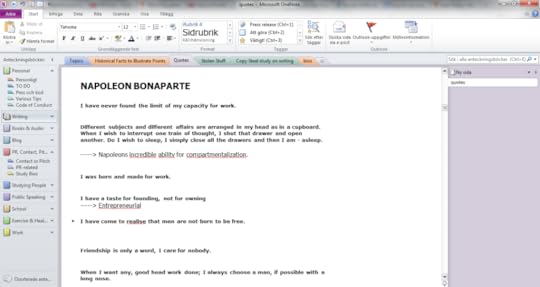
Design-related things (web design, nice looking images, code)
Journal. Run through the events of the day: it improves your memory and it’s a good excuse to write more and to reflect on the day. Here’s an example of how I format my journal:
Date
Weekday
Brief overview of the day
Different times when I am writing in the journal.
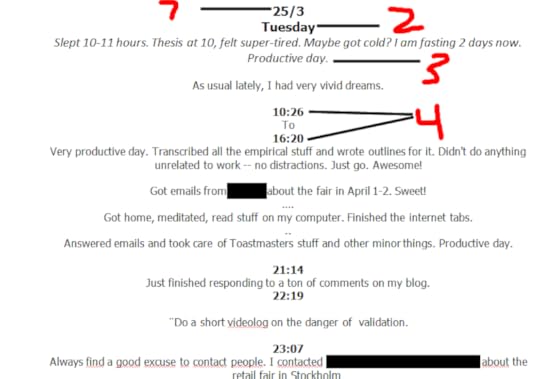
Daily lessons. Like a summary of the journal entry. What did you learn today? This one gets powerful over time
To-do lists. I keep a few different ones. I keep my general to-do list, which contains the most immediate/important things at the top of my journal to make sure I get exposed to it many times per day. You could do it differently though. There are lots of templates that you can use if you’d like. Here’s an example of a modified to-do list, as per Stephen Covey:
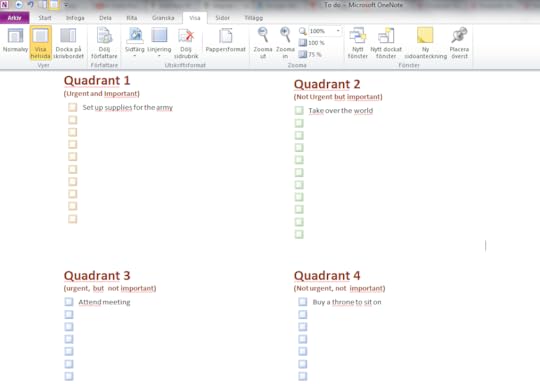
New words in other languages. As soon as you find a new word, put it in, and write the definition. If you’re ambitious you could also write some synonyms
Stocks or financial numbers. Put information, links, and relevant dates here. When did you buy the share? What was the return on investment last year?
Notes. Keep notes on the books you read on your computer or articles/blog posts you read online
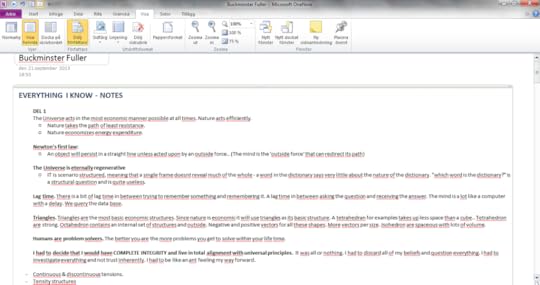
A list of good books, music, clothes, (insert item) you want to buy or download. You can then take a day and go through the lists in bulk to save time and concentration
A list of available jobs you’d like to apply to. And the necessary information or requirements
A list of interesting gigs on Fiverr, odesk, or similar outsourcing sites. You never know when it might come in handy
A list of contact information for interesting people you will contact soon, or will want to contact later when the time is right
Copy/study/steal: This is an important one. . .
–Because we learn mainly through imitation. Picasso spent his first 10 years copying other people, then he developed his own style. Napoleon read all biographies and war-related documents from all great warlords and generals before him, then he perfected his own military tactics. Einstein read most of the important texts on physics and philosophy, tinkered with gadgets, and made experiments from the time he was 10-25+ years old, before beginning his work on relativity.
Point being: it is rare that people succeed before first studying and imitating the masters who came before them. You should do the same. No need to reinvent the wheel. More on this at the end of the article.
13 Things I Study, Track, or Use My OneNote Commonplace for
Except for the things on the list above, here are some other things I keep categories for in OneNote:
Studying blogs, websites, companies, people (copy/study/steal categories)
Studying successful people
Keeping track of public speaking. My own, and others
Studying bios of successful people (how they made up their own titles). What are they selectively communicating with the limited amount of space?
Study landing pages
Studying email marketing
School and extracurricular activity schedule
Passwords and security-related things that I want to easily look up. Obviously nothing too private, just in case. You may want to use OneNote’s password protect function to keep this section safe
Book & product ideas, and various ways of making money
Book titles of best-selling books
Workout results
Food I eat and amount of meals per day
When I wake up and go to bed
There’s actually a lot more. But these are the main ones that I figured you might find useful or interesting.
How to Organize Your OneNote Commonplace
Here are some big ideas to get you started by coming up with the right categories to start compiling information:
Think about what your goals and aspirations are. Write them down. Then make a section for each of these things in OneNote
Think about what fields of knowledge you need to study to achieve your goals. Then make these your categories inside of the sections
Here’s a model of what I mean:
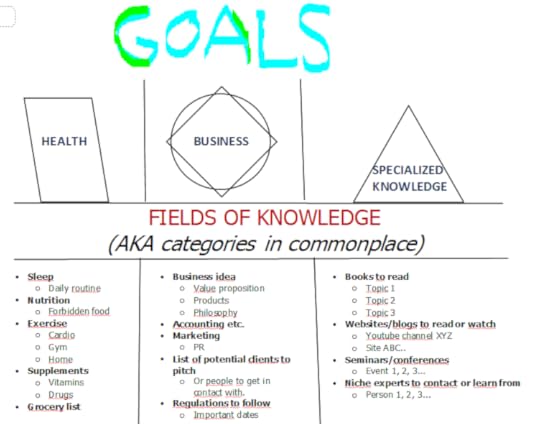
And here’s how those three sections of categories would look like in OneNote:
(Note: I just copy pasted 3 tabs into the image below for convenience sake so that I didn’t have to use 3 images)
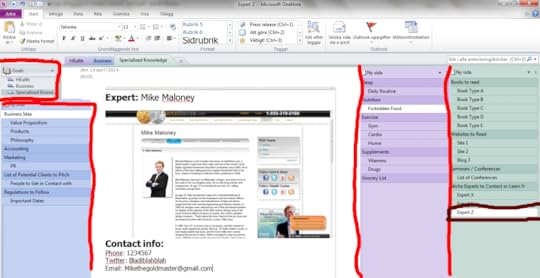
Make your copy/study/steal categories. The best people in any niche are the best for a reason. Why? That’s for them to know, and for you to find out.
Study the best people in your field and gather their best material. See if you can find commonalities and similar strategies used by the best people in different niches.
If the the best people in your field have blogs or websites, get on their mailing lists and save all the useful things to your commonplace to sift through when you have time. Then study it in bulk to find the patterns.
Go back to this material every once in a while for inspiration, to copy it, to learn from it, and to use what works. Then make it your own, like Picasso.
Think about what people you look up to and would like to learn from
Watch their (TED) talks if they have any. Take notes. Copy the interesting stuff from their Wikipedia pages or sites. Read articles about them. In my commonplace I call this section “studying people”. Most of my guys are dead.
Tips and Resources To Use OneNote Efficiently:
First I’ll tell you 3 of my favorite things, then I’ll show you some useful external resources for more studies if you’d like.
And don’t worry, it’s all free.
#1 : Getting rid of black pages
For some reason, OneNote can turn out black pages. It sucks. Here’s how you fix it:
Press “format”. This will pop up the screen to the right where you can select different formats.
Select “auto”.
Fixed. The page is no longer black!
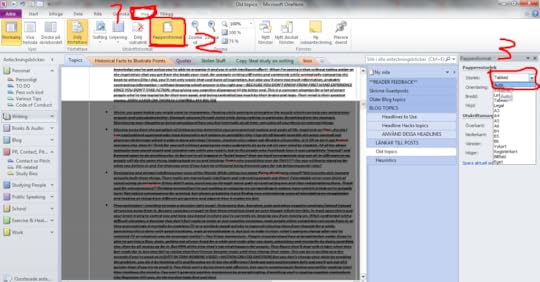
#2: Alphabetazing your pages
Check out this article, download the zip-file, extract it, and you should be good to go. Here’s how you use the add-in in OneNote:
Click “Add-ins” (mine is called “tillägg” in Swedish)
Click “Sort Pages”. It loads a while.
All your pages are alphabetically sorted.

#3:
Linking to another page/section inside of your OneNote commonplace
This is a highly useful function that I admittedly don’t use enough. But I should. Instead I just write something like “get info/cross-reference from section XYZ”. And it works, because I know the organization of my commonplace very well and can navigate through it easily. But I’d save more time if I did this.
(Note: it’s the same way you link to a website.)
Click “Insert” (Swedish = Infoga)
Click “Link” (Swedish = Länka)
A box pops up and you can choose a section inside your notebooks

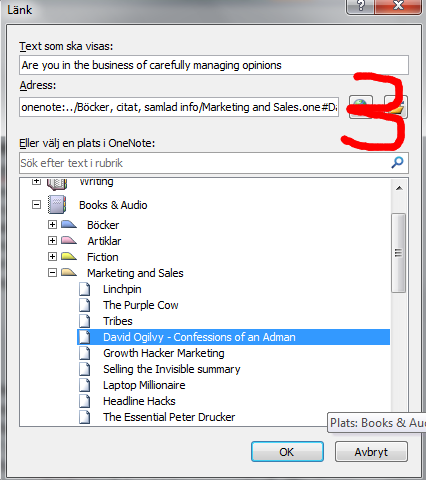
External resources:
I’ve told you about why you should use OneNote to keep your commonplace and how I do it. But I haven’t told you how to use the software. Because I think it’s very easy and intuitive. But if you think otherwise, check out the following resources to learn how to use OneNote:
–A complete list of all shortcuts in OneNote:
Keyboard Shortcuts in OneNote 2013: Even if you’re already using OneNote you should check it out. My 3 favorites ones are:
Ctrl + N = Turns the text you have selected into your standard font and size
Print screen = press the “prt sc” button on the keyboard, then Ctrl + V inside OneNote
Ctrl + B = Search for something inside of a specific page. Useful for large pages
–Onetastic add-in, useful calendar, and various macros:
Try the Onetastic add-in to bring tons of new features to OneNote: An example of a macro is “search and replace”. You can also create macros by yourself. You download the add-in or just the calendar here.
Here’s how it looks when you have installed it:

–A few macros from Onetastic:
(Note 1: These require that you download the free add-in)
(Note 2: For some people these macros are slow. But they can be nice to have just in case.)
Insert a horizontal line: Can be useful for formatting.
Word count: Because you don’t want to copy paste your text into a word doc just to check how many words there are.
Autofill tables: The same way Excel does it.
Function: Also like Excel. Lets you quickly calculate average/sum etc.
Search and Replace: Can save you time in large pages of text.
Table of Contents for a page: This is useful if you write a ton of essays or ideas in a document. Just remember to use the headings, because that’s what it uses to compile the TOC.
–Lifehacker (1) guide on OneNote
Microsoft OneNote is a Note-Taking Power Tool: A short explanatory article on of how OneNote works and some of its basic functions as a note-taking program.
–Lifehacker (2) gives some good tips on how to use OneNote:
Seven Tips and Trick to Get More Out of OneNote: Skimmable and useful. You’ll probably want to use at least one of the features.
Φ————————————————Φ
Kudos for making it all the way to the bottom. This is meaty post, I know, but it’s a hugely important one.
I have yet to find a better way of externalizing my thoughts and compartmentalizing my life than by using this system for commonplacing. Oh, and you can sync it to most smart phones too.
How many people do you know that keep a commonplace?
–I know of two people. And they did it after seeing mine. But everyone should do it.
Create your commonplace now, and you’ll thank yourself later.
It might be a hassle to set it up at first, and it might take some time until you find a system that’s working well for you. But once you do you will:
Spend time in front of the computer more productively
Become more organized
Learn things quicker
Save time
Get more ideas
Have a large storage of information that you can return to any time you need inspiration
Get a scalable competitive advantage compared to other people
It’s worth the the time it takes to set up. Do it ASAP, because the positive effects from your commonplace are exponential–like cumulative interest.
I’ve told you how I take notes and keep my commonplace. Now I want to know how you do it:
–How do you use OneNote (or other note-taking programs)?
–Do you have any useful tips for commonplacing, arranging your notes or storing your information?
–Do you use any smart ways for compiling and then compartmentalizing information?
The post How to Use OneNote to Create Your Commonplace appeared first on Startgainingmomentum.



